
Editor’s Note: 4/20 content is a part of Te Sun’s joke issue and contains exaggerated and factually inaccurate information.


Editor’s Note: 4/20 content is a part of Te Sun’s joke issue and contains exaggerated and factually inaccurate information.
By BUILDIT BIGLY Sun Staff Writer
After intense pressure from President Donald Trump, the Cornell administration has decided to make a swift change in branding, renaming the Dyson School of Applied Economics and Management to the Donald J. Trump School of Business Excellence in Business.
On April 8, the Trump administration notified the Cornell administration that it had frozen $1 billion in federal funding. The administration delivered Cornell a list of demands that, upon completion, would lead to the restoration of federal funding.
In an interview with The Sun, President Kotlikoff said, “While I cannot publicize the exact content of the list, our University refuses to comply with the demands of an unhinged authoritarian who uses executive power to destroy the institution of academic freedom. Read my lips: no complicity.”
Later in the day, however, Kotlikoff made a startling announcement in an email sent to the Cornell community that starkly departed from his generally academic tone. Seemingly influenced by Trump’s syntactical style, Kotlikoff said, “We are a place where any person can pursue any study, especially the study of BUSINESS and DEALMAKING.” Kotlikoff continued, announcing the new name for the business school.
“That is why we have decided to RENAME our SMART business school,” Kotlikoff said. “This has been in the works for a LONG time! We’re doing this HUGELY! WE WILL KEEP CORNELL GREAT!”
The statement from the Dyson School said that it would be renamed The Donald J. Trump School of Business Excellence in Business. According to the Cornell administration, the change of name represents an acknowledgement of Mr. Trump’s deep commitment to lifelong learning and academic leadership.
They cite Trump’s statement that “a book can be a big beautiful thing sometimes, with all those words in one place” as evidence of his passion for higher education. A University spokeswoman stated that Trump’s devotion to the University’s mission of “some people, a few studies,” led Cornell to make the change.
It appears that she has misquoted the motto.
Along with the name and curriculum change will come an overhaul of the interior of Sage Hall. The building, originally constructed in 1875 as the University’s first all-women’s dormitory, will receive a long-overdue makeover that includes the installation of 14 new gold toilets and velvet drapery across the entire atrium ceiling.
When asked by The Sun how the University would finance the updates to the building, Vice President for New Construction, Bilda M. Tall stated “they’re telling me the funding is being consolidated by cutting the Africana
By IMA FASHEST Sun Staff Writer
Following the University’s adoption of its finalized Expressive Activity Policy in March, administrators revised the new policy, allowing campus protests without restrictions, with only one catch: it can only be done while wearing “Make America Great Again” hats.
The newly revised policy allows for students — or anyone — to protest in classrooms, Ho Plaza and in front of Day Hall 24/7 while wearing President Donald Trump’s MAGA hats, showing the University’s commitment to supporting the “greatest president to ever live, ever” according to a statement from University admin-











istrators on Tuesday.
The policy also allows for demonstrators wearing MAGA hats to have direct access to Day Hall and even the president's office to voice their opinions on important issues to administrators. Students are encouraged to get on top of Mikey K’s desk and scream their most pressing concerns.
“It is important for this university to not restrict the speech of those who wear a MAGA hat, as it would imply that we are censoring what supporters of President Trump have to say,” the statement reads. “Censoring the speech of those who support the dictator — I mean, president — who has done so much for this country — would be contrary to the values of this university, and it is something we cannot tolerate.”
This decision follows the federal government freezing over $1 billion from Cornell after an ongoing civil rights investigation from the now defunct U.S. Department of Education. It is unclear how an unstaffed department is currently carrying out an investigation.
“The new policy allows for students wearing MAGA hats and supporters of President Trump to be as disruptive as possible on campus effective immediately,” administrators explained. Administrators later performed a cover of “Please, Please, Please” by Sabrina Carpenter in front of a photo of President Trump following the announcement.
To continue reading this story, please visit www.cornellsun.com.
Ima Fashest is a staf writer and can be reached at ifashest@cornellsun.com.












Studies and Gender Studies Departments. We’re also getting a few million by terminating the women’s ice and field hockey teams. Who needs that stuff anyways?”
According to administrators speaking under the condition of anonymity, the quick change in naming for the Trump School has absolutely nothing to do with the $1 billion in funding cuts. They say President Kotlikoff was “showing reverence for a great president” when he decided to rename the school.
Buildit Bigly can be reached at bbigly@cornellsun.com.
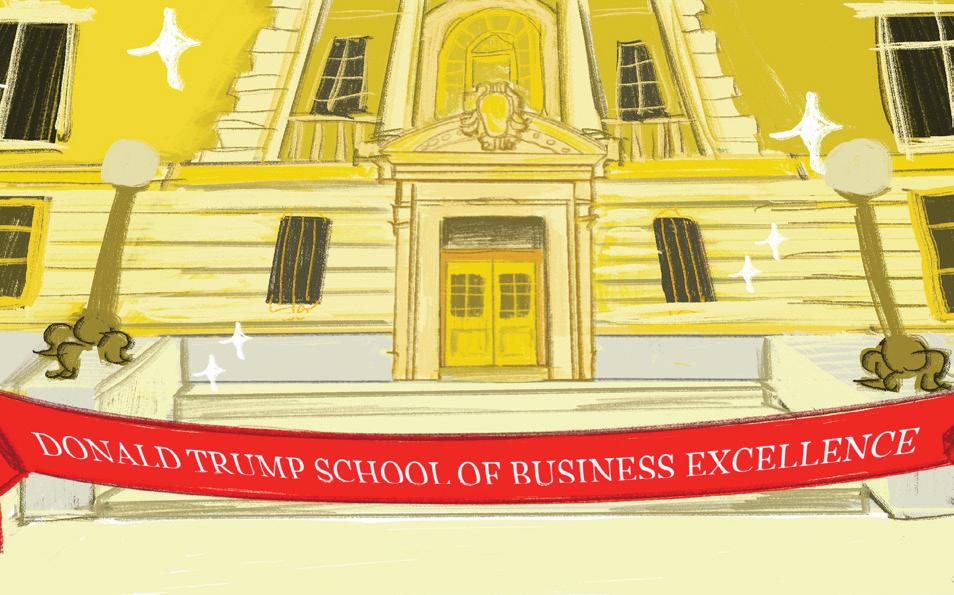
Trump time | Student wonder "what's next?" as the
school gets renamed. Yikes.
By PWOEIS DOCDEFUNCT Sun Staff Writer
The University will dedicate $1 billion in federal funding to embrace homogeneity, inequity and exclusion as part of the academic theme for the 2025-2026 school year, according to a carrier pigeon sent to the Cornell community on Sunday, April 31. Under the academic theme year, students and faculty are expected to embrace the spirit of HIE. Some of the initiatives launching this fall include: a common NetID for all undergraduate students, food rations proportional by tax brackets and senior-only libraries according to the fax signed by President Michael Kotlikoff. Additionally, all undergraduate students will have to change their names to “Michael” to comply with the homogeneity.
“The decision was all mine. I just thought everyone should have the same name to avoid confusion,” Kotlikoff said. “Michael is a beautiful name, a wonderful name.”






Dining halls will now operate under a caste system, where all students will be assigned a number based on their need for aid on their initial application. If students have a net worth of over $500,000, they will have access to all dining halls and unlimited meal swipes. Those whose families have a net worth under $100,000 will have one ration of Okenshields lunch leftovers a day. University administrators said the move would encourage students to take advantage of other side jobs to “get their bread up.”
“We have a looming recession. It is just a matter of time until the ‘brokies’ have to adapt to eating like back in the good old days when America was great,” a student who just qualified for the unlimited meal plan said. “Maybe they can start an OnlyFans or something to add some zeros to their accounts.”
To continue reading this story, please visit www.cornellsun.com.
Pwoeis DocDefunct is a staf writer and can be reached at pdocdefunct@cornellsun.com.







JULIA "SENZONHOWER" SENZON ’26
Babysitter
DOROTHY “SUNCEST 1” FRANCEMILLER ’27
Gossip Manager
MATTHEW “DID YOU KNOW HE'S PRE-LAW?” KIVIAT ’27
Kirby Room Camper
BENJAMIN “SUNCEST 2” LEYNSE ’27
Certifed Slow-Talker
VARSHA "GRAMMARLY" BHARGAVA ’27
Julia Senzon's Neighbor
CEREESE "DID YOU KNOW SHE'S ALSO PRE-LAW?" QUSBA '27
Ofce Yapper
ISABELLA "ALANI GIRL" HANSON '27
Snack Vendor
GABRIEL "BRAT" MUÑOZ '26
Sun Grandpa
JANE "DOT'S FAVORITE" HAVILAND '28
Cornell Daily Fun Editor
REEM “R.E.M.” NASRALLAH ’28
Resident Napper
ANGELINA “BOBA SKYSCRAPER” TANG ’28
Morty the Turkey Vulture
KATE “I'LL WALK” TURK ’27
I.T. Non-Specialist
JEREMIAH “MUZZ TOURD” JUNG ’28
Condiment Enthusiast
ALEXIS “A TOYOTA” ROGERS ’28
Center Midfeld
ZEINAB “KID NAMED:” FARAJ ’28
Bribery Chair
DYLAN “THE ANOMALY” GRAFF ’28
Small Forward
KAITLIN “MATCHA” CHUNG ’26
Tennis Champ
MARISSA “LEFT SAN DIEGO FOR THIS?” GAUT ’27
Orgo Survivor
SIMRAN “OH, SO SHE'S GONNA BE ON TV?” LABORE ’27
Retroactive Rain Forecaster
HUNTER “THE OTHER TWIN” PETMECKY ’28
Not a Writer
ERIC "BONG JOON BRO" HAN ’26
Hegel Consultant
SOPHIA “DID YOU KNOW SHE'S A FRESHMAN?” DASSER ’28
Super Important Position
ILANA “LIVING THE SHIT!” LIVSHITS ’27 Spreadsheet Hater
SYDNEY "MOTHER DUCK" LEVINTON ’27 Big Boss
JENNA "GINGER" LEDLEY '27
Canadian Independence Advocate
MELISSA “VALLEY GIRL” MOON ’28
West Coast Supremacist
JAMES “TOM CRUISE” PALM ’27 Te Boy
SOPHIA “ANASTASIA” ROMANOV IMBER ’28
Metaphor Department Chair
KAITLYN “WAIT SORRY I HAVE A QUESTION” BELL ’28
V.P. of Google Sheets
MAIA “MADAME ZEUS” MEHRING ’27
GCal Warrior
MIRELLA “BINGHAMTON TRANSFER 1” BERKOWITZ ’27
Unpaid Video Editor
JADE “PAPARAZZI-IN-CHIEF” DUBUCHE ’27
Unpaid P.R. Crisis Manager
KARLIE “BINGHAMTON TRANSFER 2” MCGANN ’27
Washed-Up Pipe Dream Columnist
MATTHEW “KORN-SOMETHING” KORNICZKY ’28
Guy with Camera
STEPHAN “MR. WORLDWIDE” MENASCHE ’28
Econ Victim
HANNIA “ARSON” AREVALO ’27
Local Barista
ALLISON “VETERAN” HECHT ’26 Nightly Vigilante
RENA “INDESIGN WARRIOR” GEULA ’28
Froyo Enthusiast
Jack Strap is a student at Cornell University. His upcoming column Celibacy Tuesdays is a discussion of abstinence, celibacy and — Oh, fuck! He can be reached on Sniffies
Dear readers,
Did you miss me? Because I missed you, dearly. Not as much as I miss sex though.
A while ago, I had an epiphany. Don’t you worry, I did not decide to become a religious ex-gay influencer — that would take one more failed situationship with a DL guy. Instead, I realized, I am too fixated on sex. I am too busy having sex, like: All. The. Time. If you try to reach me during the weekend, tough luck. I will be caught between a c*ck or two (maybe more!) and will not check my messages — or the emails from my editors — for the entire weekend.
In fact, I am so busy having sex that I have not had the time to write about it! I mean, I tried, trust me. But there is something fundamentally incompatible with riding it reverse cowboy style and typing away on my laptop. Something had to give. And I am far too generous not to give my hole to my frat brother of choice on a Friday evening.
But I am a man of principle, and I believe in compromise. As my ex sugar daddy Ezra always said to me (while we were having threesomes with his pal A.D.) “Do the greatest good.” So, I am launching a new column — R.I.P. Gulp Fiction — to talk about what really matters. Celibacy!
Celibate Tuesdays will run every Tuesday
Dear Cornellians,
Al Gorithm
Al Gorithm is a proud member of the College of Engineering and a mediocre staf writer for Te Sun (but only the Science section) (except this guest piece for Opinion) (but it will never happen again).
There is a reason that, when moving from grade school to college, STEAM loses the arts aspect and becomes STEM. The arts are superfluous and irrelevant, only used to get kids interested in the much more valuable science, technology, engineering and math required to be successful in life. After all, math is the universal language, and I’m a fluent speaker. It is impossible to get through a day without using math, the prime subject at the top of the objective hierarchy of importance. The Pythagorean Theorem allows me to optimize my route to class, cutting across the Arts Quad diagonally to follow the shortest possible path. I ensure that I’ve calculated the tax on my Bus Stop Bagels
order before Econ 1110 every day, so that I’m never caught off guard by the total. (I know, microeconomics is getting dangerously close to social studies territory. I’m only in it for the graphing, trust me.)
I keep my spine at the precise angle necessary to reduce strain during my three-hour chemistry labs.
On my walk to the infinitely homey and welcoming PSB, I scoff at the humanities majors in their fashionable outfits, sipping coffee in Zeus. They’ll never have jobs. I don’t have time for a sweater, scarf and acceptably-oversized leather jacket. I have vector sums to compute and internships to acquire.
To continue reading, please visit www.cornellsun.com.
(without fail, ever!) to hold me accountable to NOT having sex. I have settled on celibacy because the abstaining, ace and incel communities deserve sex free representation too! (Not that incels deserve respect, don’t get it twisted). The typing time will keep me busy long enough so I will not accidentally stumble upon a hard throbbing c*ck (Although if I stumble upon one on my desk chair, I might forget it is there when I sit down). There are many benefits to celibacy — I think, maybe? I look forward to becoming a more well-balanced individual (I am known for keeping my balance).
It will be so difficult to stay celibate — on Tuesdays only — maybe every other week — only during the school year. But with a 200+ body count, I suppose I have already seen all the violations of men that exist at Cornell, and beyond.
You may wonder what brought about this epiphany for me. I decided to do this as an act of solidarity with my fellow editors who are too busy racing to submit the print issue on Tuesday nights to get some. Although depending on the editors, I am just a Slack message away, just joking! — (maybe not)(hear me out…)(Meet me in the money toilet stall).
I looking forward to having you join me in this new chapter, (****** ******* HMU if DTF after submitting the paper??!!)
April 17, 2024 marked the seventh anniversary of Martha Pollack’s presidency at Cornell and it marked the first day we began to develop plans to abandon our alleged journalistic mission and embrace our new role as a semi-cooperative P.R. content farm led by Jade, staffed by our very own SOT columnists.
This was a difficult decision, made after discovering that not a single student knew where to pick up a print copy of the Sun. Indeed, we began deliberating over it during our last budget meeting, as the office was heated solely through Bong Joon Bro’s blunts all winter, after finding out our main benefactor cut us off over our last purchase of 10 red Birkins for each editor during Q3. We formally made the call after a skinny dip sesh in Beebe Lake where one editor declared that Ezra Cornell whispered to him, “Monetize” during his most recent acid trip.
But three times — as we were ready to proceed — we had to pause: first when Martha resigned (The Sun’s favorite president), second when our office printer caught fire by the Dickson arsonist and third when a reader emailed us his Reddit post saying that the Sun sounds like it was written by a bunch of junior highschoolers (we used Sun money to wipe our tears away). Enough is enough. Continued delay is not in the newspaper’s best interests, especially after the Trump administration’s surprise announcement of a funding freeze targeted explicitly as “leftist ink cults disguised as college newspapers.” We were the only organization named, and we are honored. Accordingly, we will now comply fully with all the Trump administration's demands.
• We have sold The Cornell Daily Sun office to our downstairs neighbor. It will now be owned by the Kava Bar, fully staffed by lowly writers. The editors will now work out of a single hammock on Libe Slope.
• Print editions will now be released once per zodiac season, in papyrus scroll form, and exclusively distributed via frisbee on the Arts Quad.
• In order to raise money for our content farm, we will be launching a new Sun-themed fragrance line: Eau de Ezra. Notes will include dust from Ezra’s tomb at Sage Chapel, incense from Temple of Zeus during midnight editing sessions and printer toner.
• We’ve formally applied for a liquor license. Our new name is The Cornell Daily (Bottomfull) Sun — truth is, we are run by demon twinks.
• In collaboration with Elon Musk and DOGE, we are developing an NFT project that includes every Sun op-ed that aged terribly. We will begin with slur-filled coverage from the 60s.
• In effort to improve our relationship with the Student Ass-embly, we have agreed to let them write half of our headlines in exchange for 1.5% of perfume purchases (cause why does it always stink in WSH). In return we will exclusively refer to the Student Assembly as Mediocre Melodies #2.
• The News section will be staffed entirely by Binghamton transfers, allowing The Sun’s reputation to be redeemed once again. The rest of the Sun will be written purely by Grok (ChatGPT is anti-DOGE).
• The Opinion section will be rebranded as Batshit Babes and all columnists must include at least two unverifiable anecdotes and a poorly-scripted reenactment of Miranda Sings apology video that we will send out one minute after the piece is published (to curb any hate mail).
• We have partnered with The Yellow Deli, Cornell’s most beloved white supremacist-themed cult cafe, to launch a new campus feature called Bit-Sized Bigotry, featuring our favorite racist moments in reels.
• All Letter to the Editor submissions must be accompanied by a love haiku to Sophia Dasser.
• We will no longer publish on Fridays, Saturdays, or Sundays no matter how important the news is. We need to sleep — or go out — and maybe if we slept you would see less typos.
Lastly, we’d like to reiterate that The Cornell Daily Sun is an dependent, elite-run publication pledging its allegiance to The New York Post and to the journalistic standards for which it stands, click bait, partisan and conservative values. Unless there is a higher bidder. Until then, thank you for your readership. We accept Venmo, Cashapp, Crypto, and Zeus Chais. In love and libel, The Cornell Daily Fun Editorial Board

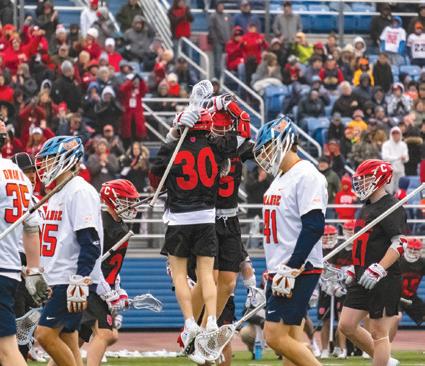

By MATTHEW KIVIAT Sun Assistant Managing Editor
April 14 — The University joined litigation against the U.S. Department of Energy and DOE Secretary Chris Wright, according to a Monday email from President Michael Kotlikoff and Provost Kavita Bala. The plaintiffs of the case are alleging that proposed immediate cuts to indirect costs for University research grants are unlawful by violating federal regulations.
This is the second time this semester that the University has had to take “the unprecedented step of seeking emergency judicial intervention after a federal agency abruptly breached the negotiated rate for indirect costs,” the administrators wrote.
The lawsuit was officially filed by the Association of American Universities, the American Council on Education, the Association of Public and LandGrant Universities and eight other land grant institutions against the DOE and its secretary, Chris Wright, on Monday. It was filed in the U.S. District Court for the District of Massachusetts.
When research is conducted through a grant, indirect costs “are necessary for the research to occur but harder to attribute to individual proj-
ects,” according to the lawsuit.
According to the plaintiffs, the DOE cuts directly violate regulations on indirect costs that the Office of Management and Budget created “precisely to provide needed stability, protect reliance interests, and ensure that recipients can cover the actual costs of conducting the research that the government has selected them to undertake.”
The lawsuit highlights that such negotiated indirect cost rates need to be “accepted by all Federal agencies.”
On Feb. 10, Cornell, along with 11 other Universities, filed a lawsuit against the National Institutes of Health. The lawsuit also challenged funding cuts related to indirect costs, alleging that the action was a violation of federal grant regulations and administrative law.
The NIH proposed a 15 percent cap to indirect costs, while historically, the percentage of grant awards allotted to indirect costs can vary between 27 and 28 percent, according to the February lawsuit.
To continue reading, please visit www.cornellsun.com.
By KATE TURK Sun Assistant News Editor
April 11 — In a unanimous vote, the Student Assembly passed Resolution 45, “Assembly Response to the Funding Cut,” on Thursday, requesting that the University keep the Assembly informed regarding University responses to the recent $1 billion funding cut by the federal government.
“We’re asking that when [the University] gets new information, they tell us. That’s what this resolution is, in essence,” said Adam Vinson ’25, Student Assembly executive vice president and a sponsor of Resolution 45.

By BENJAMIN LEYNSE
April 14 — In an update to a University Seventeen current and former students have had their Student and Exchange Visitor Information System records terminated by federal authorities, and at least four of the 17 reported that their visas were revoked, according to a Cornell spokesperson. This development comes after The Sun’s Monday article reported that the University quietly updated an FAQ webpage, revealing that “a small number” of international students have had their SEVIS records terminated. At the time, University officials twice declined to disclose to The Sun how many students were affected.
On Tuesday, a University spokesperson shared a statement with The Sun detailing the number of SEVIS record terminations. Of the 17 whose records were terminated, nine are current students and eight have graduated, the spokesperson wrote.
In recent weeks, hundreds of students across the country have had their visas revoked and now face potential deportation. As of April 12, the legal status of over 1200 international
students has changed.
SEVIS is a web-based system that the U.S. Department of Homeland Security maintains, which tracks students on visas. The University can audit student SEVIS records, and has stated that they are actively checking SEVIS for updates. When a student’s SEVIS record is terminated, they lose their student status. If SEVIS records are terminated for a violation of their status, students must leave the country immediately unless they apply to have their SEVIS status reinstated — a process that can only begin if a designated school official provides a recommendation for SEVIS status reinstatement.
If a student’s status is not reinstated, they may face consequences — including deportation — for remaining in the United States.
While SEVIS records are viewable by educational institutions, students are notified of visa revocations individually. On March 31, Cornell International Services issued guidance that urged students to notify the University if they received correspondence saying that their visa was revoked.
The resolution comes amid reports that $1 billion in Cornell’s federal funding, primarily for contracts with the departments of agriculture, defense, education and health and human services has been frozen, according to members of the Trump Administration. In a statement released shortly after the report, the University said that they had “not received information that would confirm this figure,” but revealed that Cornell received 75 stop work orders for research into topics including jet engines, robotics and cancer.
To continue reading, please visit www.cornellsun.com.
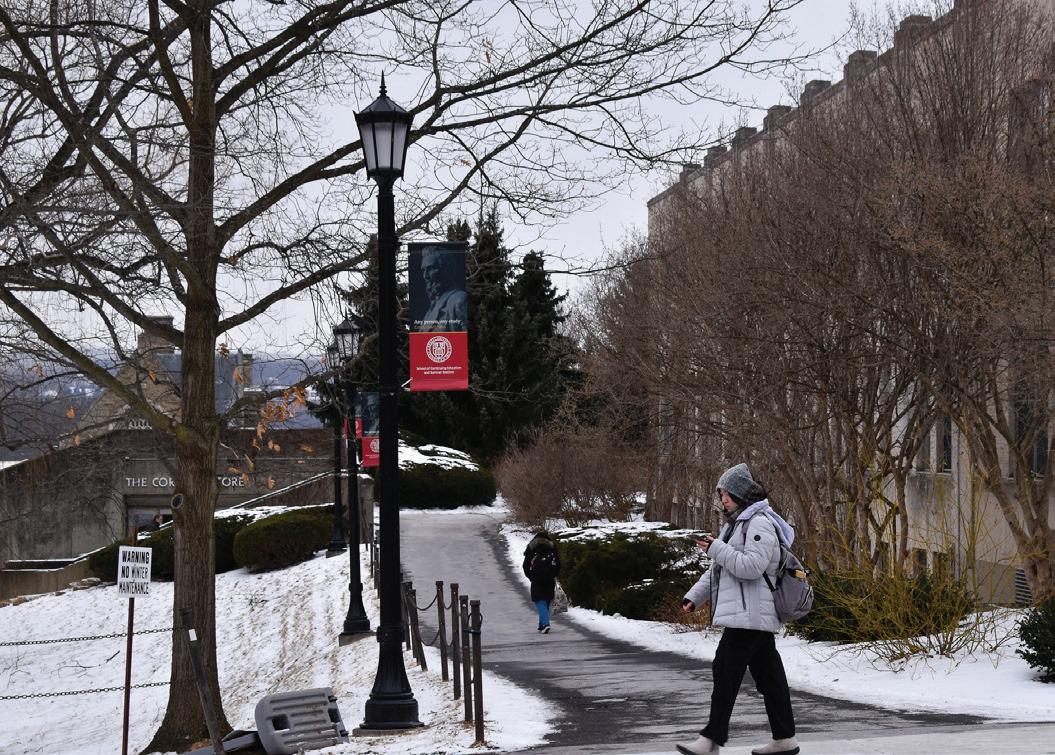
Wednesday, April 16, 2025
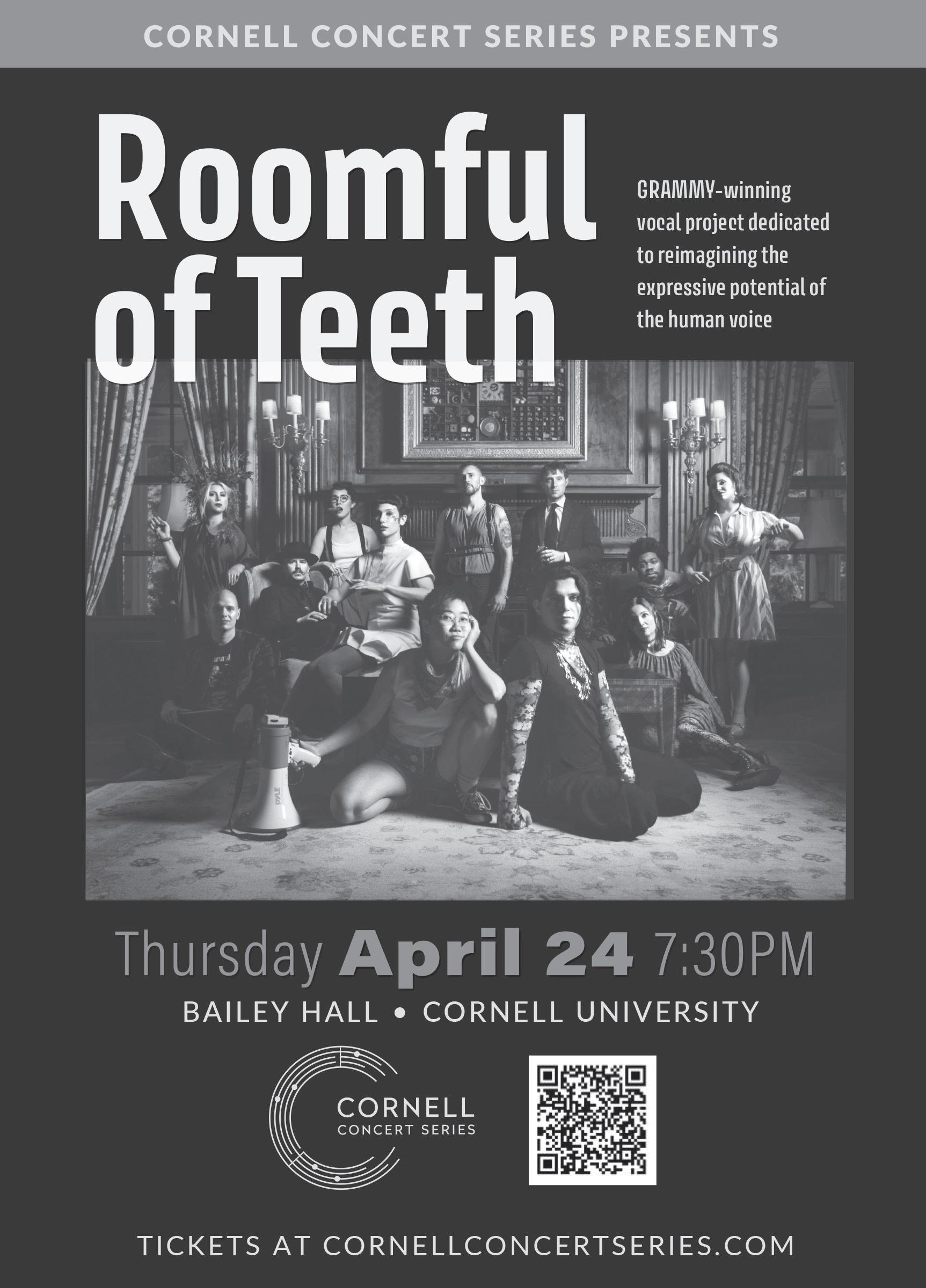
Dan Fagin
Pulitzer Prize-winning science writer, Professor of Journalism, Director of the Science, Health, and Environmental Reporting Program, New York University
Thursday, April 24

Student Leaders: Recognizing Implicit Bias Noon - 1 p.m., Online
Man’s Best Friend 5 p.m. - 7 p.m., Cornell Cinema
The Final Career Fair: Summer 2025 Opportunities and Beyond 6 p.m. - 7:30 p.m., Phillips 203
Career Chats with International Alumni 7 p.m. - 8 p.m., Online
Moral Outrage: Who Are We to Say? 7p.m. - 8p.m., Klarman Hall KG70 Today
Tomorrow
Good Trouble in Times of Censorship — An Archive Visit with Susie Bright, founder of women-run erotic magazine On Our Backs 4 p.m. - 5 p.m., Cornell’s Kroch Library Room 2B48
Interview Skills Workshop with Professor Whitehead 5 p.m. - 6 p.m., Myron Taylor Hall
Anabel’s Grocery x Marginalia Poetry Open Mic Night / Community Dinner 6 p.m. - 7:30 p.m., Anabel Taylor Hall Free ZUMBA
6:30 p.m. - 7:15 p.m., Helen Newman Hall B16
Self-Defense Workshop with CUPD 6:30 p.m. - 7:30 p.m., High Rise 5 Sky Lounge



• Lecture 1: The future of the monarch butterfly and biodiversity in the Anthropocene 11:05am, Lecture G10 Biotech
Refreshments will be served before the talk, beginning at 10:45am
• Lecture 2: Science communication in the age of denialism
4:30pm, Atkinson Hall 121
Refreshments will be served after the talk
Co-sponsored by University Lectures Committee and the Department of Entomology


www.cornellsun.com
By ROWAN WALLIN Sun Senior Writer
April 10 — In an electric night of music and competition, the Slope Day Programming Board announced Kehlani as Slope Day headliner and Louis The Child as the opener after a student DJ competition in the Willard Straight Hall Memorial Room.
Five student DJs went head-to-head this evening for a coveted spot on the Slope Day 2025 lineup as a prelude for the Kehlani announcement. The winner will be announced via the Programming Board’s Instagram soon.
Known for her soulful R&B songs like “Nights Like This,” “Can I” and “After Hours,” Kehlani will take the stage on Libe Slope this May, giving a performance to cap

off the academic year the day after the last day of instruction.
The supporting performer, who will take the stage just prior to Kehlani, will be Louis The Child, known for their songs “It’s Strange,” “Slow Down Love” and “Better Not.”
Earlier in the evening, the DJs — DJ Danik, FREQ, Two (Asian) Friends, 2TB and DJVLOHH — battled it out in the strobe light-lit competition, showcasing their skills in house, techno, hip-hop and other genres. The eventual winner (to be announced) will perform their set as the gates open on Slope Day.
During the event, Absolute Zero Break Dance Club met upstairs in Willard Straight Hall. After hearing the music throughout Willard Straight Hall, Jordan Jennings ’28
and others in the club came downstairs to breakdance.
“I’m a freshman, so I’ve never been to Slope Day before, but I’ve heard so much about it,” said Jennings. “I’m really looking forward to [it]; I think it’d be a good end to my freshman year.”
The student band Lucky Strike, who won the Big Red Battle of the Bands competition held on March 22, will open for Slope Day. Slope Day 2025 is scheduled for May 7 and will be open to the Cornell community. Student wristbands are required for entry, and wristband reservations and sales begin tomorrow at noon.
Prof. Noah Tamarkin, anthropology and science & technology studies, raised a hypothetical scenario to further explore the potential risks of surveillance.
“In the event, for example, that laws in the U.S. dictated that all protest activity is criminal activity, would we be in a position to protect ourselves as a university community?” Tamarkin asked. “If the activity that we understand to be lawful is suddenly deemed unlawful, and we’re asked to hand over video surveillance, what would that scenario look like?”
Honan responded, assuring the Senate that current policies protect First Amendment rights. “As of right now, First Amendment speech is protected, and we don’t use these systems unless there’s a violation of New York State law.”
Rowan Wallin can be reached at rwallin@ cornellsun.com.
By AMANI AGRAWAL and ANGELINA TANG Sun Staff Writer and Assistant News Editor
April 15 — Cornell’s Women Higher Education Now is taking action to protect women’s access to education following the loss of federal funding that once sustained the Asian University for Women in Bangladesh, which offers full-ride scholarships to its campus for women who cannot afford an education.
WHEN is a student organization that is partnered with and raises money for AUW to support women’s education. It primarily holds fundraisers such as selling cookies and flowers. According to its Instagram, the organization aims to “explore and spread awareness on issues about gender equality, sustainable development, and equitable education.”
AUW offers full-ride college scholarships to women who would otherwise be unable to access or afford
education. The scholarship offers awardees the opportunity to study on AUW’s campus. Additionally, AUW awards smaller scholarships to students studying elsewhere in the world, including Cornell.
The AUW formerly received “millions of dollars” of federal funding from the U.S. government, according to a junior on the WHEN executive board, who spoke on the condition of anonymity due to fears regarding her status as an international student. However, under the Trump administration, “the U.S. government suspended their complete financial support” for Afghan women at AUW “with immediate effect,” the WHEN executive board member said.
In February, the U.S. Agency for International Development, which previously supported economic growth and provided humanitarian aid in foreign countries, was significantly reduced in size by the Trump administration. All direct hire person-
nel were placed on administrative leave globally and the amount of foreign aid distributed was significantly reduced.
Women attending AUW on full scholarships from the university are generally those who are underprivileged or whose “families do not want them to pursue an education” and will not financially support them, according to the WHEN executive board member. This puts “thousands of students at risk” if funding is lost, according to the anonymous executive board member.
When its funding was cut, AUW reached out to WHEN and informed it of the need for more financial support. Despite WHEN’s inability to fully compensate for the difference in lost federal funding, according to the anonymous executive board member, they are not discouraged from their fundraising efforts.
“The amount [AUW is] looking for is way larger than our capacity, but it just gives us motivation to do
as much as we can,” the anonymous executive board member said.
Serena Wu ’28, WHEN’s co-director of fundraising and finance, described how the funding cuts have shaped the group’s operations and sense of urgency.
“Knowing that they need smaller organizations like us definitely pushed us a little bit more into gear to try and do the most we can,” Wu said. “We definitely have big goals, big dreams, but we’re trying to increase our membership [and] get the word out. … We know there’s a lot of good people at Cornell that want to help and would be very on board with the mission.”
To continue reading, please visit www.cornellsun.com.
Amani Agrawal can be reached at aagrawal@cornellsun.com.
Angelina Tang can be reached at atang@cornellsun.com.
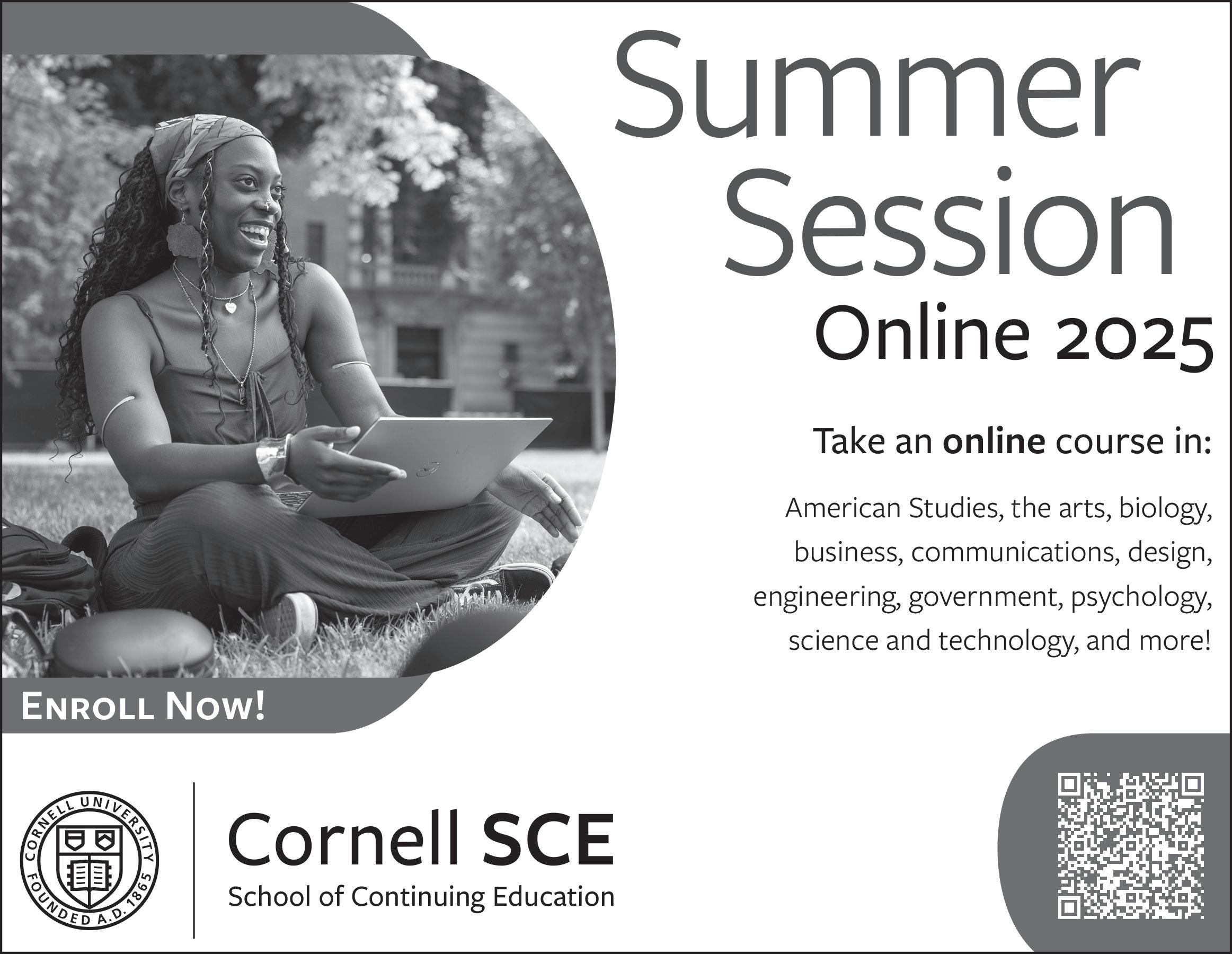
Editors Note: 4/20
By SUN PHOTOGRAPHY DEPARTMENT

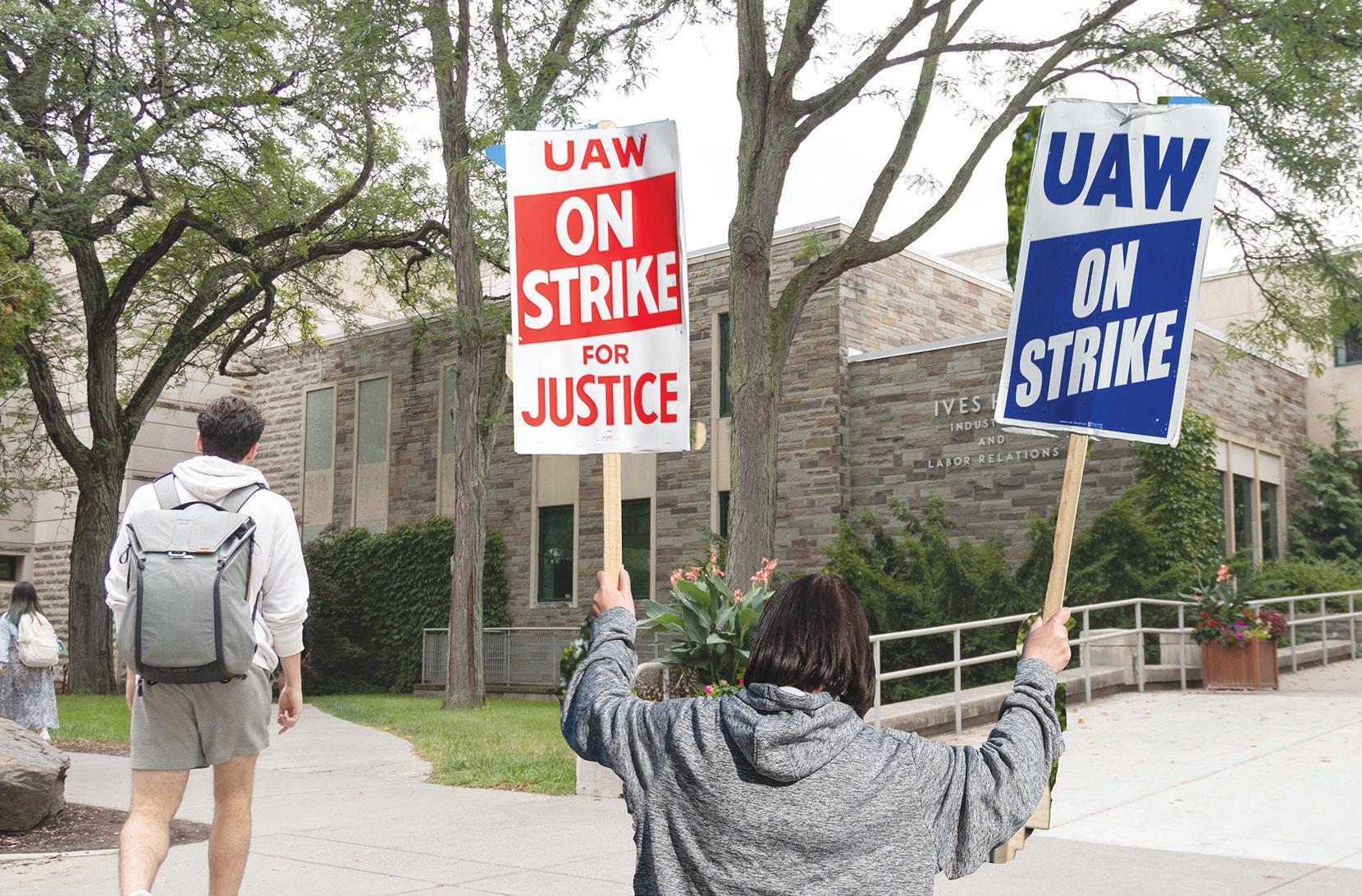

GETTING THE BAND BACK TOGETHER | After complaints about this year’s headliners, Slope Day Programming Board has decided to change the 2025 lineup to a COIN reunion concert.



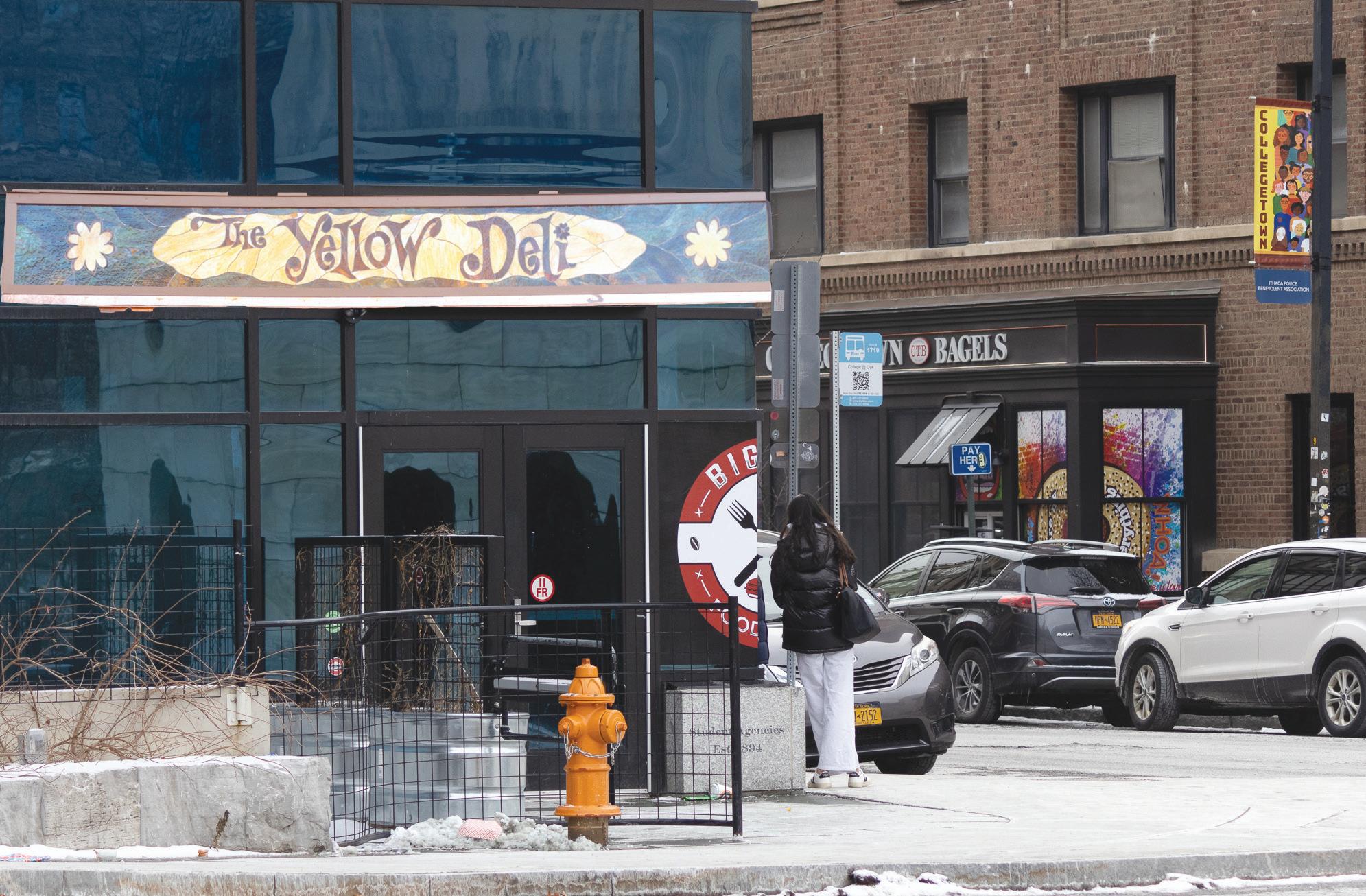
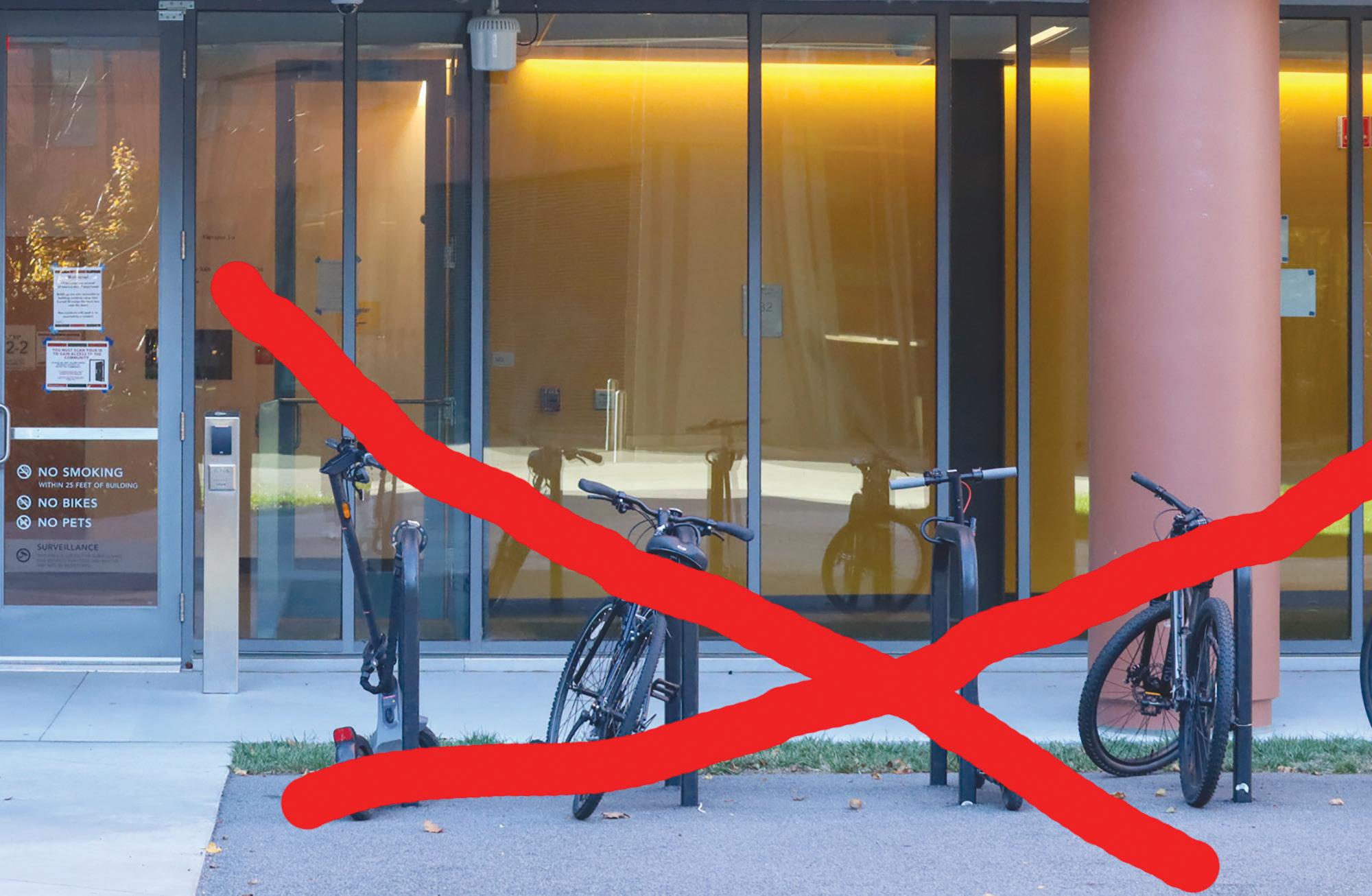
By ANANT SRINIVASAN and HOPE THOMAS
Contributor and Sun Staff Writer
April 15 — Cornell University’s Student Assembly is holding elections for the 2025-2026 school year this week. Voting in this year’s Student Assembly elections began online on Monday and will remain open until next Monday, April 21, at noon.
Zora deRham ’27 Seeks Another Term as Student Assembly President
With a year under her belt as Student Assembly President, Zora deRham ’27 aims to apply her institutional knowledge and experience to another term.
“I’ve been honored to serve as Student Assembly President this past year,” deRham said in an interview with The Sun. “There are plenty of projects that have been started and I want to make sure I can see them to fruition.”
Last spring, deRham ran for the seat as a freshman, with a campaign centered around bringing “a fresh outlook on Cornell” to student government and pursuing far-reaching, long-term initiatives. That vision helped her win the support of Cornell’s student body, with a victory of 45.5 percent of qualified votes.
deRham said her biggest success as Student Assembly President has been “improving the Assembly’s engagement with the student body.”
Looking ahead, deRham predicts that “the state of the world off campus is going to present challenges even on the Student Assembly.” She acknowledged that external events beyond Cornell can stress students and emphasized the importance of advancing campus issues “in the midst of really large global issues and national issues.”
Ameera Aftab ’26 Brings National and State Level Advocacy Experience to Student Assembly Presidential Race
With a background that spans years of student advocacy at the local, state and federal level, Ameera Aftab ’26 is running for Student Assembly President with a focus on transparency and equity.
Aftab said her diverse educational background — attending school in Pakistan, community college in New York and now Cornell — shaped her passion for student advocacy. She currently serves as the minority students liaison at-large at the Student Assembly and sits on the College of Agriculture and Life Sciences Dean’s Council.
“Turning funding into action” is a central theme of Aftab’s campaign. In the Student Assembly’s upcoming byline funding cycle, over $6 million in student activity
fees will be distributed across clubs and campus initiatives,” Aftab said. “Students have a right to transparency about how that money is being spent.”
“I’m not running for the title,” Aftab said. “I want to show that student government can actually work, and that it can work well.”
Eddy Pang ’28 Chooses to Embrace Transparency Through Listening to the Needs of His Peers on Campus
After having the opportunity to create a strong community of friends and become involved in campus life, Eddy Pang ’28 wishes to provide this same experience to all of the Cornell community. He plans to do this through the simple act of listening.
“The main thing I am running on is being able to listen,” Pang said.“Coming from a first-year perspective, it’s easy as an upper-classman to think you know everything … I am the first to admit that I don’t know everything. I’m the last person to know the intricacies of Student Assembly, the mechanisms of resolutions, etc., but I’m here to listen and learn.”
Pang envisions an interconnected Cornell community that is fostered through Student Assembly sponsored events.
According to Pang, the first step to fostering community in Cornell is through increasing transparency and making students more aware of the role of the Student Assembly.
Christian Flournoy ’27 Acts as an Advocate for Student Voices and the Cornell Community
As Student Assembly undergraduate representative at-large and the vice president of diversity equity and inclusion, Christian Flournoy ‘27 is ready to use his experience as President of the Student Assembly.
According to Flournoy’s candidate biography, he wants to focus on “providing the student body with Transparency, Engagement, and Advocacy.”
Flournoy plans to implement transparency by being clearer about upcoming resolutions, and providing more information on how The Assembly runs. He hopes that through greater transparency, the student body will have more confidence that The assembly is adequately representing them, according to his published statement.
To continue reading this article, please visit www.cornellsun.com.
Anant Srinivasan and Hope Tomas can be reached at as4342@cornell.edu and hthomoas@cornellsun. com.
believe in, and I am here to fight,” Suarez said in his candidate bio.
Ezra Galperin
April 15 — Cornell students have the opportunity to choose who will represent the voice of the student body for the 2025-2026 academic year as the Spring 2025 Student Assembly election cycle begins. Voting opened Monday and students can cast their online ballot up until April 21 at noon. This year, four candidates are running to be the next Executive Vice President to replace incumbent Adam Vinson ’25. Saad Razzak
Saad Razzak ’26 studies government and currently acts as the College of Arts & Sciences Representative on the Student Assembly.
In his candidate bio, Razzak prioritizes abolishing prelims the night before breaks, getting construction “under control” and “tackling” the Cornell housing crisis.
In an email to the Sun, Razzak addressed voters: “You should vote for me because I am capable of working with all types of people, but also standing up for the things I believe in and the things I value, like student independence, academic freedom and campus safety.”
David Suarez
David Suarez ’27, a fashion studies and American studies double major, campaigned with the slogan “David Equals Inclusion, DEI” – which he maintains is his largest focus as EVP.
In an email to the Sun, Suarez stayed on theme, stating “I have the Dedication, Experience, and Insight to make your visions a reality.”
“I come to you at a time when we must fight for what we
Ezra Galperin ’27 is double majoring in government and Jewish studies in the College of Arts & Sciences.
This year, he served on the Student Assembly as an Undergraduate Representative At-Large and chaired the dining committee, where he co-sponsored a resolution urging the administration to implement meal swipes to Trillium.
Galperin is “here to tackle the everyday challenges we all face” and make Student Assembly resources more accessible to the student body, according to his candidate bio.
“Let’s cut the nonsense and boost real student engagement together!” Galperin said.
Christian Flournoy
Christian Flournoy ’27 is the only candidate who is part of the College of Human Ecology. He has served various roles on the Student Assembly, including freshman representative, undergraduate representative at-large and vice president of DEI.
Flournoy believes that the Student Assembly is in need of a “new framework”, focusing on “maximizing student voice” and effectively representing the community, according to his candidate bio. He also calls for more transparency in the assembly and increased engagement with the student body.
To continue reading this article, please visit www.cornellsun.com.
By ISABELLA HANSON Sun News Editor
April 13 — After approval by both Cornell Graduate Students United, a union that represents the interests of graduate workers, and the University, the union’s first collective bargaining agreement was formally ratified on Friday. The contract ratification passed with 97 percent approval by CGSU.
CGSU, which is registered under the United Electrical, Radio and Machine Workers of America, has negotiated with the University for a year, reaching a tentative agreement on March 25. The agreement included provisions such as an agency shop, just cause protections and pay raise increases. This tentative agreement, which underwent intense review by both bargaining committees, has officially been ratified.
After one year of negotiations between Cornell and the CGSU bargaining committee, the tentative agreement includes a 3.9 percent increase on the 12-month base stipend, a 100 percent TCAT pass subsidy and 12 vacation days per year for graduate student workers. Additionally, the parties agreed to dental and vision insurance and a onetime $750 matriculation payment provided to each graduate student worker, which can be used to cover the costs of applying or re-applying for visas.
“We value the vital contributions of our graduate student workers to the university’s teaching and research missions, and we look forward to continuing our partnership under this new agreement.”
President Kotlikoff and Provost Bala
On March 19, Cornell agreed to a modified agency shop in the tentative, now ratified, agreement. An agency shop is a workplace where union membership is not required, but all employees are required to pay an agency fee to the union representing them.
However, Cornell’s agency shop is modified to allow students who do not want to join or fund the union on “moral or ethical grounds” the option to donate the equivalent of their funds to a charity, according to a University spokesperson.
In a University statement sent on Friday, President Michael Kotlikoff and Provost Kavita Bala wrote, “We value the vital contributions of our graduate student workers to the university’s teaching and research missions, and we look forward to continuing our partnership under this new agreement.”
CGSU, who launched a strike pledge on March 13 before coming to a compromise with the University regarding the modified agency shop on March 19, additionally expressed satisfaction with the final contract.
According to an Instagram post by CGSU, once the contract was ratified, the organization vowed to “hold Cornell accountable to respecting our contract by enforcing all of the benefits, rights and protections we have received through our grievance procedure and the power of a union.”

JULIA SENZON ’26
Editor in Chief
ERIC HAN ’26
Associate Editor
SOPHIA DASSER ’28
Opinion Editor
ILANA LIVSHITS ’27
Assistant Opinion Editor
AUDREY IM ’26
Business Manager
SOPHIA TORRES ’26
Marketing Manager
SYDNEY LEVINTON ’27
Arts & Culture Editor
JAMES PALM ’27
Assistant Arts & Culture Editor
JENNA LEDLEY ’27
Assistant Arts & Culture Editor
MELISSA MOON ’28
Assistant Arts & Culture Editor
SOPHIA ROMANOV IMBER ’28
Assistant Arts & Culture Editor
KAITLYN BELL ’28
Lifestyle Editor
MAIA MEHRING ’27
Lifestyle Editor
KARLIE MCGANN ’27
Photography Editor
MATTHEW KORNICZKY ’28
Assistant Photography Editor
STEPHAN MENASCHE ’28
Assistant Photography Editor
MIRELLA BERKOWITZ ’27
Multimedia Editor
HANNIA AREVALO ’27
Graphics Editor
JADE DUBUCHE ’27
Social Media Editor
HUNTER PETMECKY ’28
Layout Editor
RENA GEULA ’28
Layout Editor
The Sun’s View
DOROTHY FRANCE-MILLER ’27
Managing Editor
MATTHEW KIVIAT ’27
Assistant Managing Editor
VERA SUN ’27
Advertising Manager
ALEX LIEW ’27
Human Resources Manager
BENJAMIN LEYNSE ’27 News Editor
VARSHA BHARGAVA ’27 News Editor
ISABELLA HANSON ’27 News Editor
CEREESE QUSBA ’27 News Editor
REEM NASRALLAH ’28
Assistant News Editor
ANGELINA TANG ’28
Assistant News Editor
KATE TURK ’27
Assistant News Editor
GABRIEL MUÑOZ ’26 City Editor
JANE HAVILAND ’28 Features Editor
JEREMIAH JUNG ’28
Assistant News Editor
KAITLIN CHUNG ’26 Science Editor
MARISSA GAUT ’27
Science Editor
ALEXIS ROGERS ’28
Sports Editor
ZEINAB FARAJ ’28
Assistant Sports Editor
DYLAN GRAFF ’28
Assistant Sports Editor
SIMRAN LABORE ’27 Weather Editor
ALLISON HECHT ’26
Newsletter Editor
Editor’s Note: After interviewing all presidential candidates who were available, Te Sun’s editorial board has decided to abstain from endorsing any candidate for president. Te Sun editorial team believes no presidential candidate demonstrated both the policy commitments and consistent actions necessary to fully refect the institutional values of this paper.
Cornell stands at a precipice. With a $1 billion funding freeze from the Trump administration and the Student Assembly entering a byline funding year, the stakes are much too high for the normalized ambivalence the student body holds towards Assembly elections. Student representatives must meet this moment with both courage and competence — and that begins with leadership that understands the magnitude of the work ahead and is willing to do it. At this critical moment, Te Sun places its trust on Saad Razzak ‘26 for executive vice president of the Student Assembly.
Razzak is the current representative for the College of Arts & Science and chair of the Academic Policy Committee. He has spent his term working on the kind of steady change that is often undervalued in campus politics. But it’s precisely that seriousness — of purpose, of vision and of follow-through — that sets him apart. He is pushing for tangible academic policies: pushing for resolutions to prevent prelims from falling on Election Day or the eve of breaks and advocating for clearer credit transfer protocols.
He crucially balances this local efcacy with a clear-eyed understanding of broader political challenges. When national politics reached our campus in the form of defunded research and executive orders threatening our most vulnerable students, Razzak authored Resolution 36, urging the University to fnd alternative funding for defunded research and to take legal action against executive orders at odds with federal and state laws. He worked closely on Resolution 37, which outlines concrete protections for immigrant, undocumented and refugee students — from legal support to mental health resources.
Troughout our interviews, Razzak spoke with honesty about bureaucratic challenges and institutional delay. He did not overpromise or romanticize the role of EVP. Instead, he emphasized strategy: cross-Assembly legitimacy through collaboration with the Faculty Senate, careful rapport with University administrators and early engagement with the Student Activities Funding Commission and byline funded undergraduate student organizations to demonstrate that the Assembly cares about each group’s concerns amid potential funding cuts. To continue reading, please visit www.cornellsun.com.
Anurag Agrawal is the James A. Perkins Professor of Environmental Studies in the College of Agriculture and Life Sciences. He is feld biologist and studies the Ecology and Evolution of Botany and Entomology. His column Candor and Chlorophyll runs periodically this semester. He can be reached at profaagrawal@cornellsun.com.
Istudy how plants resist predators. Sometimes plants poison predators, other times they escape; often plants just tolerate them. In my research I seek to understand why plants have evolved one way or the other — what are the internal drivers and trade-ofs shape resistance to predators? But this column is not about plants. It’s about people.
Just as plants adapt to survive, we too must adapt to the changing landscape of our society. Our government — those of several other countries — have pivoted from centrist policies to what seem to be radical changes — changes that have pushed many who once felt secure to the margin. It is shocking, scary and hard to make sense of. If you voted for this — it’s your chance to be represented, and I hope you are getting what you asked for. But, for those that did not, many of us are too confused to know what to say or do. I certainly feel that way. It feels like a cloud over me — not unlike how I felt in the early days of the COVID-19 pandemic. Yet understanding and action seem critical. I am reminded of the classic grunge from my youth: “Take your time, hurry up, choice is yours, don’t be late.”
A friend suggested, “Tink globally, act locally,” encouraging me to focus on making a difference in my immediate community. My dean proposed a diferent form of resistance: teach the best class you can. Publish the best research ever. Feel our power through the things we already know how to do. Some of us are writing op-eds, others are wondering why we are not taking to the streets. Finding your resistance is part of a larger duality — balancing external political action with internal resistance, the kind that can quietly hold us back.But beyond the personal, beyond the immediate, as scholars we must also grapple with the bigger picture. To the extent possible, we need to think less about feeling displaced, and more about what that displacement represents. Is it the erosion of foundational principles? Is it the normalization of rhetoric that seemed unthinkable even a year ago? A deliberate shift? Te changes we are seeing appear to
be both systemic and targeted — a confuence of broad societal shifts and specifc policy changes. Resistance isn’t just about protesting in the streets, though that certainly has its place. It’s about demanding transparency, holding our leaders accountable and refusing to accept any single narrative. We must seek multiple perspectives — each likely speaks some truth. We must navigate a landscape of competing narratives, seeking out diverse sources and engaging in critical analysis. For me, fnding a balance between engagement and anger, caring and the need to disconnect and talking and staying silent will be important. I am allowing myself at times to both be comfortable and uncomfortable. After all, how we feel in our daily lives is not always a reliable measure of how well society is functioning. Sometimes we are just pretending. And maybe that’s okay — for a time.
But we can do better as a society. Although I do not believe humans have made long-term societal progress beyond the obvious — less violence, better health outcomes and greater equity — we should strive for it. Progress can perhaps best be measured against the specifc injustices of our current time — if you believe we have transgressed, speak out. Progress often demands discomfort, a willingness to challenge our own status quo and a commitment to defending whatever we may hold dear. We should all be able to commit to some form of progress while also taking care of ourselves.
Tis is a call to be informed, strategic and to do whatever empowers you to stay engaged. Our collective goal for a diverse, equitable and inclusive society is not a sprint — it’s a marathon (in my case, a 10K). We must choose to act, not only react, with clarity, purpose and understanding of what’s at stake. Te resistance we feel has little to do with the future we want, rather it is a personal battle shaped by who we are and past experiences. But the future we inherit is being shaped not by those in power, but by the choices we make now. I don’t yet know what the right choices are for me. But I better get on it — and fnd my resistance.
Philip Lewis, Professor Emeritus of Romance Studies, served as dean of the College of Arts and Sciences from 1995 to 2003 and as vice-president of the Andrew W. Mellon Foundation from 2007 to 2015.
Iaman admirer of both Professor Eric Cheyftz and President Michael Kotlikof Trough- out his distinguished scholarly career, Cheyftz has been a vigorous and cogent defender of faculty governance as well as a persistent and articulate critic of academic administration. I believe his calls for faculty involvement, such as his column in the April 7 Cornell Sun, under the divisive circumstances now confronting research universities make good sense. At the same time, I have an appreciation of the position of research university presidents under the current conditions that difer from Cheyftz’s. Believing that support for the university has to be the priority in this fraught moment, I would like to urge faculty, staf and students to refect on my take on the situation.
Te history of Cornell and other American research universities since the late 19th century is indisputably one of corporatization. Te leaders of such institutions — notably presidents and trustees — are caught up in the extraordinary complexities and pressures of a multifaceted busi- ness that is integral to the operating system of our capitalist economy and democratic society. We can question higher education’s complicities with the system, but not its vital importance and embeddedness in it.
Contrary to the assumptions made by many observers who are participants in or products of the system, those institutional leaders, whether supportive or critical of the system, enjoy precious little room to maneuver. Compelled to practice caution and seek compromise, they are unable to respond favorably to many of the conficting voices or constituencies they encounter. Te fow of demands evolves dynamically and makes for an impossible juggling act. Since the time of crisis triggered by the COVID-19 pandemic, the imperatives and constraints have become so overwhelming that American higher education is now plagued by the increasing difculty of fnding qualifed leaders who are able and willing to take on presidential responsibilities.
Two key implications of this predicament deserve to be underscored.
Te frst is that the rush to blame administrators — especially presidents — for all the (in) actions and policies to which one objects is unlikely either to be helpful or to be commensurate with the challenges at hand. Administrative judgments often have to be made on the fy and are sure to be criticized even when they are plainly overdetermined.
Te second is that in times of institutional crisis, the principal task of high-level leader- ship shifts from long-term corporate strategy to short-term, hands-on management for survival, which may well focus on doing what is immediately necessary in order to minimize harm, preserve the status quo, enable negotiation and so forth. Decision-making in these trying mo- ments is a collective responsibility that entails extensive teamwork. Attributing it primarily to individual presidents or trustees, rather than to the institution as a corporate body, is a dubious proposition.
Looking at the current situation of Cornell through these lenses and with a concern for its role in the world at large, I submit that the university’s trustees made an entirely reasonable decision when they asked Kotlikof to shed interim status and assume fully the role of president. Prolonging the presidential search would neither dilute the competition with other searching institutions nor improve the sparse crop of candidates. Moreover, the stunning political de- velopments since Jan. 20 make it urgent to confront the federal government through a fully empowered president rather than a lame duck.
Still more to the point, the issue to be confronted by Cornell and more broadly by higher education at large is how to defne the guiding interests of the corporate university in a world of political chaos and on a planet veering toward uninhabitability. Te campus community stands to beneft from the broad experience, expertise and vision that Kotlikof has acquired over time. In his recent, superbly crafted essay in the March 31 New York Times, he set forth a level-head- ed, shrewdly balanced commitment to enduring values that all Cornellians should applaud.
Paul Caruso is a frst year MPA
reached at pcaruso@cornellsun.com.
Since the dawn of his second presidency, President Donald Trump has signed over 100 executive orders, many of which impact students at Cornell. Just eight days into Trump’s administration, Interim President Kotlikoff issued a statement announcing a “planning team” devoted to navigating this deluge and answering community questions.
Among the most concerning actions is Executive Order 14173, which targets diversity, equity and inclusion programs within the federal bureaucracy. It further demands compliance from federal grant recipients, particularly universities, which received further threats in a Department of Education letter on Feb. 14. The order is already facing class-action lawsuits claiming it violates the Fourth and Fifth amendments and is unenforceable based on its overly broad terminology.
I argue that Cornell University and its community ought to stand its ground, rebrand none of its programs and fight the federal government on its right to revoke funding on such bases. To retain federal grant funding, some may argue that Cornell should change or cancel its own DEI programs. Professors and students may consider changing the language of their research to avoid federal combing. Their concerns are legitimate, but the university ought to guarantee to fight on their behalf.
The need to fight is greater now than ever after the Trump Administration issued Cornell over 75 stopwork orders on April 8, potentially impacting $1 billion. According to a statement from President Kotlikoff, the cuts regard national security and health projects. Cornell’s peers were also impacted, including Northeastern, Harvard, Columbia, Brown, Princeton and the University of Pennsylvania. It is unclear if the freeze is related to the Department of Education’s spurious investigation into Cornell for violating civil rights. This has set up a natural alliance between these institutions.
If the Department of Education follows through on its threats to strip funding, Cornell should be ready to sue, defending both the integrity of its DEI programming and the legality of its federal grants. Fortunately, the university administration has already shown a willingness to act in this way. On Feb. 10, Cornell joined 11 other universities in suing the National Institutes of Health over its cutting of indirect cost allocations in their research grants.
It is with bated breath that the university’s staffers and researchers specializing in DEI await financial action by the Department of Education. In the meantime, Cornell ought to prepare for a potential legal battle. Through coalition-building, like the one against the NIH, Cornell can share resources with other associations and universities in their lawsuits.
A Feb. 21 statement from Interim President Kotlikoff suggests that Cornell will follow the law when it comes to DEI initiatives. That statement, en-
titled “Cornell’s guiding principles,” specifically describes “diversity as a driver of our excellence,” and states a commitment to nondiscrimination. Importantly, the administration used “our excellence,” acknowledging the positive osmosis effect that DEI initiatives have on the rest of the university. This provides the antithesis to the Trump Administration’s claim that DEI breaks the law. To Cornell, regardless of whether you call it DEI, we follow the law, and the law says we can be as inclusive as we want.
Cornell has a long battle ahead in defending DEI as a core institutional value as the Trump administration seeks to curtail DEI at academic institutions. That same Feb. 21 statement reiterates diversity as baked into the very foundation of the school. Not only does it redefine how the university sees inclusion, but it also references our core values. Assuming that it is referencing “a community of belonging,” this elevates the statement to a preemptive commitment to defend DEI.
“If the Department of Education follows through on its threats to strip funding, Cornell should be ready to sue.”
Paul Caruso, MPA student
Other universities are grappling with handling the threats from Trump’s Department of Education. Philadelphia local news reported on Feb. 25 that local lawmakers walked out of a meeting with the University of Pennsylvania over its erasure of DEI initiatives amid compliance with the department’s threats. In that meeting, University of Pennsylvania administrators reportedly called the Trump administration a “bully” that had turned DEI into a “lightning rod,” forcing DEI removal as a survival mechanism.
These are ironic words from a university founded by Benjamin Franklin. Franklin’s lightning rod protected people’s homes from lightning strikes — we ought to use DEI to protect our comwmunity with a ferocity the federal government is not prepared for. Meanwhile, state governments are echoing these attacks. It was reported on Feb. 27 that the Texas state legislature proposed $400 million in cuts to higher education and is targeting DEI initiatives in state universities.
Cornell has the opportunity to stand up for itself, its community and all of America’s universities. As one of the first universities in the nation (and notably the first Ivy League) to admit Black Americans and women, it is in our DNA to defend our community tooth and nail. Doing so would not only be the moral choice but also make Cornell the flag-bearer of university resistance to a Trumpian bully.
Nothing would make me prouder to be a Cornellian than for my university to again adopt the challenge, and the anthem: Bring it on
Armand Chancellor is a fourth year student in the Brooks School of Public Policy. His fortnightly column Te Rostrum focuses on the interaction of politics and culture at Cornell. He can be reached at achancellor@ cornellsun.com.
For two days last month, the Godless university was no more. Christians crawled out of their hovels and sallied forth out of Anabel Taylor Hall to take over Ho Plaza for nine hours. They displayed the 7,000 (or hundreds, in the case of Cornell) who had not bowed the knee, who had refused to acquiesce to the intellectual suicide of the Godless university.
In mid-March, Christian pastors and apologists (i.e. defenders of Christianity) Cliffe and Stuart Knecthle came to campus, the closest thing to Socrates in Plato’s dialogues coming to fruition. Hundreds of students, not just from Cornell but from all over, gathered together in the center of campus not to hear someone drone on about their worldview but for dialogue. As I watched, mesmerized that such an event could occur at a modern-day university, a friend remarked, “This is the first time I have seen the college circle.” In the college circle, a prominent trope in many college movies, students from different majors and walks of life gather together for discussion.
But why did it take two Christian pastors to bring about this hallmark of the university? We have world-renowned professors and intellectuals. It is simple: The circle is a truth-seeking enterprise. Everyone comes with preconceived notions, which are challenged until contradictions are resolved through reason. This is the genuine Socratic method, not mere proof of claims by authority (e.g. educational background) but reasoning together to find truth. The University no longer seeks the truth because they have bought into the lie that it does not exist.
The only truth is that there is no truth: a statement seemingly copied from George Orwell, but might as well be the modern university’s motto. This thinking has seeped into almost every classroom, poisoning the pursuit of education. Its fruits were on full display when people who did not buy into the myth finally took center stage.
Why does Christianity have to be the only right answer? Many other ways of life also claim to be the way to God. Why are those claims not equally valid? The pastors give an enlightening answer: Christianity claims an exclusive pathway to God; if
any other way of living also led to God, that would raise a contradiction. Christianity would be false, and if it were false, why follow it? A similar question the pastors received: Why can’t all religions have some truth? The Apologists explained that such a question could only come from the hubris of an educated Westerner. To think that they would somehow respect all religions by lumping them together as if they did not make exclusive and contradictory claims is incredulous. Truth is an inherently restrictive exercise. Why care about truth? The post-modern misconception that truth is about one’s perspective is freeing; in this, humanity is unbounded. But a problem arises with this idea, which answers not only why we should care but also why truth forces us to care: objective truth exists whether we want it to or not. Even if all of society were to say that the Sun rises in the west and sets in the east, the next day, the Sun would still rise in the east and set in the west, no matter how much one yells at it. This is not a bug of truth but a key feature of it. This is what allows us to have meaningful conversations with each other. If everything is based on perspective, then reasoning is useless. If everyone is their own arbiter of truth, how can one be wrong and need correcting? If all the rulers are faulty and there is no true ruler, how can one even correct the scales? This is not something to mourn over but to celebrate. It allows appeals to be made even above the heads of even the world’s most powerful people. It allows people like Martin Luther King Jr. to say and mean, “We shall overcome because the arc of the moral universe is long but it bends towards justice.” In a world where truth is relative, the universe has no arc, the only burden on humanity is its own imagination. All you can say to Southern slave owners or Adolf Hitler is that personally you think they shouldn’t be doing that. The same as you would say to your drunk friend who wants to go up on the roof during St. Patty’s weekend.
To continue reading, please visit www. cornellsun.com.
Jan Burzlaf is a Postdoctoral Associate in the Program for Jewish Studies. Ofce Hours (Open Door Edition) is his weekly dispatch to the Cornell community — a professor’s refections on teaching, learning, and the small moments that make a campus feel human. He can also be reached at profburzlaf@cornellsun.com.
Every question we ask in the classroom is, quietly, a bet on the future. Even when the news is bleak. Even when everyone is tired. Even when we don’t know what the end of the semester — or the world — will bring. To ask a question is to assume there’s still something worth understanding. To pose a problem is to believe that thinking together still matters. In difcult times like ours, that may be the most radical thing about teaching and learning: It insists on the possibility of meaning.
A few weeks ago, I was very disheartened by the election results in Germany, where I grew up. Te far-right Alternative for Germany, or AfD, party won over 20 percent of the vote. One of their platform positions is that the Holocaust has been greatly exaggerated, part of what they dismiss as a national “guilt cult” that the country should move beyond. Tat rhetoric — casually cruel and deeply dangerous — has a way of lingering. Tat same week, I taught a unit on everyday encounters during World War II. In class, we discussed blurred moral lines and moments of unexpected solidarity. Students asked thoughtful, tough questions. And somehow, that was enough to lift the weight for me. I walked out of class reminded that learning from each other can be a quiet act of resistance.
To continue reading, please visit www.cornellsun.com.
By BHAVYA ANOOP Sun Contributor
Cornell researchers have a new understanding of how bumblebees interact with flowers: through a “chemosensory roadmap” within the flower’s scent. This is the focus of a study by Prof. Robert Raguso, neurobiology and behavior, and graduate student Kirsten Keleher. Their article was published in Current Biology on April 7.
“I study what floral traits are attractive to different groups of pollinators,” Keleher wrote in an email statement to The Sun. While her thesis focuses on bird pollination, this paper examines how bumblebees navigate flowers, namely the Impatiens capensis and Impatiens pallida species.
The study’s key discovery is what the team calls a “chemosensory roadmap.” This means that different parts of a flower
emit different chemical signals that teach bumblebees how to interact with the flower. While nectar scents are attractive to bumblebees, other parts of the flower emit compounds that are deterring. This strategy allows plants to train bees in a manner that supports pollination.
Experimental techniques used by the team include chemical analysis methods, such as gas chromatography-mass spectrometry, which is a technique that allows scientists to separate and identify compounds in a substance.
They also conducted behavioral experiments using bumblebee colonies and artificial flowers. For instance, in one experiment, bees were presented with “cafeteria-style” flower arrangements of varying scents and tastes, after which their preferences were measured by how much of the sugar-water solution they consumed.


According to Keleher, one of the biggest challenges in designing and conducting the experiments for this study was the limitation of time.
“For the chemical portion of this study we had a somewhat brief window where we could collect the flowers we needed. We also always have to take extra care to develop a protocol for chemical analysis where compounds will not co-elute,” she said.
In GC-MS, compounds with similar properties can be difficult to identify because they move at similar speeds through the experimental medium. This can obscure which chemicals are present in each part of the flower, which is crucial to understanding how bees respond to different scents — hence the extra care taken.
Overall, the team’s findings suggest that bees do not only respond to the presence of floral scents, but are capable of learning and adapting to specific
arrangements of scents. This can explain how, over time, bees learn to approach complex flowers in an efficient manner which minimizes damage to flowers.
While this study focused on bumblebees, the team is also interested in seeing if these findings apply to other pollinators, floral visitors, and complex flowers.
“We believe there may be similarly partitioned compounds and/or the same compounds in other complex flowers to provide a similar sort of chemosensory roadmap,” Keleher said.
To study this, the team has already completed solvent extractions — using chemical liquids to isolate scent compounds — for seven other flower species. They plan to analyze these results to see if their findings can be more broadly generalized.
Bhavya Anoop can be reached at ba436@cornell. edu.
By MATTHEW CHEUNG
Sun Contributor
The Cornell Autoboat project team placed fifth at RoboBoat 2025, a weeklong competition held in Sarasota, Florida where students from universities all over the world design, build and test
“It’s been kind of an incredible journey to get here. Our team was founded when I was a freshman. We’ve been able to build up this incredible base of knowledge, talent and experience that has helped us get to this point.”
Slava Koblov ’25
autonomous surface vehicles, or self-driving boats.
This ranking makes them the second best collegiate ASV team in the nation. Despite being one of the youngest project teams at Cornell, members point to the team’s willingness to adapt new strategies and the setting of
explicit goals as the keys to their success.
“It’s been kind of an incredible journey to get here,” said Slava Koblov ’25, one of two full-time leads who focuses on hardware.
“Our team was founded when I was a freshman. We’ve been able to build up this incredible base of knowledge, talent and experience that has helped us get to this point.”
Going forward, the team decided to adopt a two-year design cycle. Rather than create a new boat from scratch, they will make improvements on the boat from last year’s competition, affectionately named Clifford.
“In those intermediate years, software can really develop with a platform that will reliably stay the same and consistent, which really helps them out. And that was a game changer this year,” Slava said.
Neha Naveen ’27 spoke on her experience in Florida. She uses computer vision to feed the boat data about its surroundings and inform its actions.
“They have this giant lake, and there’s multiple tasks in the obstacle course that we need to get through.” Naveen said. “I get to work with things that I maybe only learned in theory, like in class. Actually working on a real
model and integrating [CV] is a completely different thing.”
Rajarshi Das ’26 also attended the event. He heads robotics, working closely with hardware and software. “The experience was great. We were basically walking around looking like special agents in the Florida summer with sunglasses and walkie-talkies,” he said.
Those at the competition also
“The conversations were amazing. They have so much experience in life, once you start talking with them the conversation goes on forever.”
Rajarshi Das ’26
emphasized its deeply collaborative environment. The only other American university that placed ahead of Cornell was the University of Michigan – with whom the Cornell team has a special relationship.
Das described how Cornell Autoboat’s shortcomings last year spurred this partnership. “Any time you looked over at our station, you would see two people from the Michigan team helping

us out. Because of that experience we built together, we became really good friends. And for the last few years, we’ve had this little tradition where we go have a team dinner with Michigan.”
While in Florida, members of Autoboat also enjoyed a meal with the Cornell Club of SarasotaManatee, an organization for local Cornell alumni. Das said the members were “very invested” in Autoboat’s progress from last
year. “The conversations were amazing. They have so much experience in life, once you start talking with them the conversation goes on forever,” said Das. “The experience was great. Again, I wouldn’t have this if I didn’t join Autoboat.”
Matthew Cheung can be reached at mcc296@cornell.edu.
By Vivien Dobrescu
Vivien Dobrescu is a first-year in the College of Architecture, Art and Planning. She can be reached at vmd33@cornell.edu.
If there were an “if you know, you know” drink, it would be Yerba Mate. Yerba Mate is a South American herbal drink similar to tea that has energizing properties and deep-rooted cultural value. Today, Yerba Mate has become a cult favorite drink because of its natural caffeine properties that give you a boost in energy without the typical caffeine crash. The drink has become quite commercialized and is widely distributed and marketed as a canned caffeinated tea, popular among college students as a healthier energy drink alternative.
As Yerba Mate drinks become more popular, demand for them is increasing, specifically on college campuses, including at Cornell. While you definitely can’t find Yerba Mate everywhere, here are a few spots that reliably sell Yerba Mate in and around campus!

1. Bear Necessities (RPCC)
RPCC has consistently sold Yerba Mate in a variety of different flavors year-round. They’ve installed a Yerba Mate-branded refrigerator, which probably means Yerbas will be sold here for the foreseeable future. Yerba Mate is typically about $1 more expensive than at other vendors or grocery stores, but the proximity to campus likely outweighs the cost!
2. Straight from the Market: Willard Straight Hall
Another consistent spot on campus that sells Yerba Mate drinks is the market in Willard Straight on the first floor above Okenshields. This is one of the only places on Central that sells Yerba Mate, so just
be sure to take note of their hours, as they are closed on weekends.
3. 7/11: Collegetown
7/11 has basically everything you could need in a pinch, including a variety of Yerba Mate flavors. Grab N Go Mini Mart | Collegetown
This mini mart on Eddy St. is super close to campus and is well stocked for a convenience store. They have Yerba Mate in stock pretty consistently, along with a variety of energy drinks.
5. GreenStar: Collegetown, Downtown, & Ithaca
GreenStar is almost always well stocked, with an entire refrigerator dedicated to just Yerba Mate. GreenStar offers Yerba Mate at significantly better prices—around $2.99 compared to $3.99 at other vendors—and frequently runs deals on these drinks as well.
6. Wegmans: Ithaca
Wegmans sells almost everything you could imagine, including Yerba Mate. Buying Yerba Mate at grocery stores like Wegmans is also always cheaper than buying Yerba Mate on campus.
7. Walmart: Ithaca
Walmart is another one of the big box stores that reportedly sells Yerba Mate. While I’ve never purchased Yerba Mate from Walmart, this website shows that they are sold in stores in Ithaca.
8. Target: Ithaca
Similar to Walmart, I have never bought Yerba Mate from Target before, but they are reportedly available to purchase in stores. Target’s online website says that the Lansing Target location has limited quantities of Yerba Mate in stores, but they are available online.
9. CVS: Ithaca
CVS occasionally has Yerba Mate in stock. CVS’s website says Yerba Mates are sold in stores in the Ithaca location, but they carry quite limited flavors.
While this list is far from exhaustive, these are the places in and around Cornell that somewhat reliably sell Yerba Mate on the regular! Every once in a while, Yerba Mate vendors distribute drink promos as part of their University of Yerba campaign around college campuses nationwide. Be sure to stop by if you ever see a yellow van handing out Yerba Mate!



By Ruhi Datar
Ruhi Datar is a first-year in the College of Arts and Sciences. She can be reached at rrd56@cornell.edu.
We’ve all been there – a gloomy Ithaca Monday morning, dread for your next class and a long week ahead. All you want to do is throw on your most comfortable pair of sweatpants and rush out the door with a messy bun. Sure, some might say that comfort is key, but I’d argue that there is something else that can actually make a bigger difference: the intentionality of dressing up and having a slow morning routine.
For me, the best days always start with a little ritual — my roommate and I listening to “Charm” by Clairo, sipping on our coffee and getting ready at the same time. We pick out cute outfits, do our makeup and put our best foot forward. It’s peaceful, it’s calming and, honestly, it sets the tone for the whole day.
I’ve noticed such a huge difference between days when I take my time in the morning, versus the days I’m scrambling out of bed before my 8:40 am class, still half-asleep. The days when I wake up earlier and allow myself that hour to get ready feel so much more productive and optimistic. The act of dressing up and taking time in the morning isn’t just about looking good — it helps improve several other aspects of my day: A sense of control. Taking the time to get ready in the morning, instead of rushing out the door, gives me a sense of control over my day. Especially at a school like Cornell, where it’s so easy to feel overwhelmed by everything that needs to get done in your day; but slowing down – intentionally choosing an outfit I feel good in, doing my makeup, sipping on my cold brew –gives me a moment to breathe before the my classes and whatever else I have planned. It’s a simple act of self-care that helps me mentally prepare for whatever ensues during the day. I’ve found that the calmness usually lingers, and I find myself feeling more centered, even when the schedule gets busy. There are many small acts people incorporate into their morning routines that help them feel more in control. For example, Kate Sahin ’28 explains that “making my bed in the morning
“Taking the time to get ready in the morning, instead of rushing out the door, gives me a sense of control...”
Ruhi Datar ’28
gives me a sense of order to start my day,” while Estelle Emmons ’28 says “I take my vitamin supplements every morning to feel more put together.”
Boost of confidence. There’s also something about putting on a wellthought-out outfit that makes you feel more put-together — like you have your life in order, even if you really don’t. Studies have shown that dressing well can actually boost confidence and even improve performance. While a good outfit can make you feel more put together and confident, it’s also about how it affects your mindset. Psychologists refer to this as enclothed cognition — the idea that what we wear can influence our mindset, behavior and even how we perceive ourselves; it’s all about embodying confidence.
Improves your overall mood. Wearing an outfit you love also brings a small but meaningful boost to your day. Fashion is a form of self-expression, and the clothes we choose can shape how we feel about ourselves. When you put on something that makes you feel happy – whether it’s your favorite sweater, a bold pair of sunglasses, or your best fitting pair of jeans – it can shift your entire mindset.Sanika Saraf ’28 states, “Whenever I wear my jean jacket I feel good. I love a Canadian tuxedo.” Even on tough or gloomy days, dressing up can act as an uplifting force. Mikayla Thomas ’28 illustrates this perfectly: “I always wear my favorite Free People tank top to boost my mood because the shirt feels like summer, which makes me feel happy.”

In the end, dressing up and taking time for a slow morning routine is about so much more than just looking good — it’s setting yourself up for the best possible day. Whether it’s the sense of control that comes from allowing yourself the time to take a breather, the confidence boost that comes from wearing the perfectly fitting top or the sheer joy that comes from self-expression that fashion brings, it all adds up. These small moments of intentionality can make a huge difference, especially at a place like Cornell, where it’s easy to feel overwhelmed. So, next time you’re tempted to skip the extra time for yourself and rush out the door, remember that a little intention in the morning can change your entire day for the better.

By EMMA GALGANO Sun Staff Writer
April 10 — A revocation of all South Sudanese passport holders in the United States may impact Cornell, which has two students from South Sudan enrolled, as of Fall 2024. Secretary of State Marco Rubio announced that all visas would be revoked on April 5, citing the African nation’s alleged refusal to repatriate its citizens who are subject to deportation.
In response to inquiries about whether the University intends to take legal or diplomatic action on behalf of the South Sudanese individuals affected by the visa revocation, a Cornell spokesperson wrote to the Sun, “We continue to actively monitor this situation and urge all international students to review our March 31 guidance.”
The guidance, shared by Cornell’s Office of Global Learning, advises any student who receives notice of visa revocation to forward the message to International Services at international@cornell.edu. Cornell also encourages students to regularly check the international service website for updates.
Rubio justified the visa revocation by accusing South Sudan of failing to repatriate its citizens who are subject to deportation from the U.S.
“Enforcing our nation’s immigration laws is critically important to the national security and public safety of the United States,” Rubio wrote. “Every country must accept the return of its citizens in a timely manner when another country, including the United States, seeks to remove them.”
Since President Donald Trump returned to the White House on Jan. 20, the sweeping visa revocation marks the first action of its kind targeting an entire nationality.
During his campaign, Trump emphasized hardline immigration policies and has since moved to roll back Temporary Protected Status designations, including those granted for migrants from South Sudan under the Biden administration.
The deportation case at the center of the dispute involved an individual who was initially identified by U.S authorities as a South Sudanese national. However, South Sudan’s foreign ministry later clarified that the person was not from South Sudan, but was a Congolese national named Makula Kintu. South Sudan rejected his deportation, citing the misidentification and sent him back to the U.S for further processing.
“The government deeply regrets that despite a history of cooperation, South Sudan now faces a broad revocation of visas based on an isolated incident,” the ministry said. No formal actions against individual students or employees from South Sudan at Cornell have been reported.
Emma Galgano can be reached at egalgano@cornellsun.com.
By OLIVIA HOLLOWAY Sun Senior Writer
April 10 — Five of the 13 pro-Palestinian protesters detained by Cornell University Police Department officers during the Pathways to Peace walkout have denied offers for their cases to be dismissed during a hearing in Ithaca City Court on Wednesday.
Case dismissal is based on the condition that defendants would not be arrested again prior to the end of a probationary period set by the prosecution. Those who accepted the dismissal deal will not have a criminal record, while those who did not accept will have to reappear in court for further hearings that could result in trial and conviction.
The 13 defendants — made up of Cornell staff, students, alumni and Ithaca locals — were arrested and charged with disorderly conduct after staging a walkout protest of the Pathways to Peace panel on March 10. The panel featured a discussion between four speakers about the war in Gaza.
The walkout was organized by Students for Justice in Palestine, a student organization that has since been suspended. Protesters argued that the panel was unbalanced in favor of Israeli voices. SJP additionally denounced one of the panelists, Tzipi Livni, the former vice prime minister and former foreign minister of Israel, who faced war crime allegations and warrants for her arrests from the UK in 2009 based on her decisions made before and during an Israeli offensive in Palestine.
Those who rejected the dismissal deal intend to continue to fight the case.
“We are prepared to fight this with every constitutional tool we have available,” Defense Attorney Sujata Gibson said. “We can’t let this keep happening because it is chilling speech. People have to be able to react.”
The probationary time frame for the proposed adjournments in contemplation of dismissals varied between defendants — a move that was criticized by Gibson after the hearing. According to Gibson, ACD deals are typically contingent on defendants not being arrested or involved with criminal activity for six-month periods. However, last year’s Day Hall protesters were offered “semester ACDs,” which reduced that time frame to one month, the remainder of the 2024 spring semester.
To continue reading this article, please visitwww.cornellsun.com.
at oholloway@cornellsun.com.
By JEREMIAH JUNG Assistant News Editor
April 10 — Students gathered at Day Hall on Wednesday to protest the recent $1 billion funding cut to Cornell by the Trump administration, condemning both federal action and Cornell’s “compliance and complicity.”
Organized by the Coalition for Mutual Liberation, Jewish Voice for Peace, Cornell Students for Justice in Palestine and Young Democratic Socialists of America, the protest aimed to highlight how University policies — particularly those related to immigration enforcement, disciplinary transparency and divestment — “laid the groundwork for these cuts by capitulating to fascism’s demands in advance.”
“Cornell has stayed silent while the Trump administration defunded universities, disappeared students to abusive immigration detention facilities, and attempted to shutter the Department of Education,” the organizations wrote in a collaborative Instagram post on Tuesday. “Cornell’s stated commitments to ethics and fairness have eroded as they cater to donors and trustees more than students and workers.”
The statement also accused the University of failing to protect immigrant students and international scholars, citing the case of Momodou Taal, a graduate student who fled the U.S. after facing deportation proceedings, which the post said was exacerbated by University cooperation.
Protesters gathered near Day Hall at 5 p.m., where they started with a chant of “Free, free Palestine,” after which they began using pots, pans, recorders and their voices to make noise and list their frustrations with University administration.
Throughout the event, protestors criticized specific administrators, including President Michael Kotlikoff and Christina Liang, Senior
Associate Dean of Students and Director of the Office of Student Conduct and Community Standards.
“F*ck you, Kotlikoff” and “F*ck you, fascists,” students chanted towards Day Hall.
The protest featured four speakers, including Sam Poole ’28, who criticized the University’s decisions to suspend protestors, allow ICE on campus and retract commitments to DEI policies and gender-affirming care. He also called for administrators to fight back and stand with its student body, concluding with a chant of “No hate, no fear, immigrants are welcome here.”
“We’re giving our administration feedback from its student body, from its faculty, from its graduate students, from its community: we will be on your side if you stand up,” Poole said to the Sun. “But we’re not going to support you unless you do that.”
Another speaker, an organizer from JVP, criticized the Trump administration’s labeling of past protests as anti-semitic, saying that protesting is “actually a very Jewish thing to be doing.”
A member of SJP, which has been suspended after 17 of their protestors were detained at the Pathways to Peace event in March, also spoke to the crowd, condemning the actions of the University and the Cornell University Police Department at the event. 13 protestors were arraigned at Ithaca City Court earlier that day.
At one point, students passing by interrupted the protestors as they walked past, shouting at them to “Read a book,” among other remarks.
Organizers ended the demonstration with a statement vowing to continue pressuring the administration to resist the “demands from the fascist Trump administration” and to stand up for and protect each other.
Jeremiah Jung can be reached at jjung@cornellsun. com.
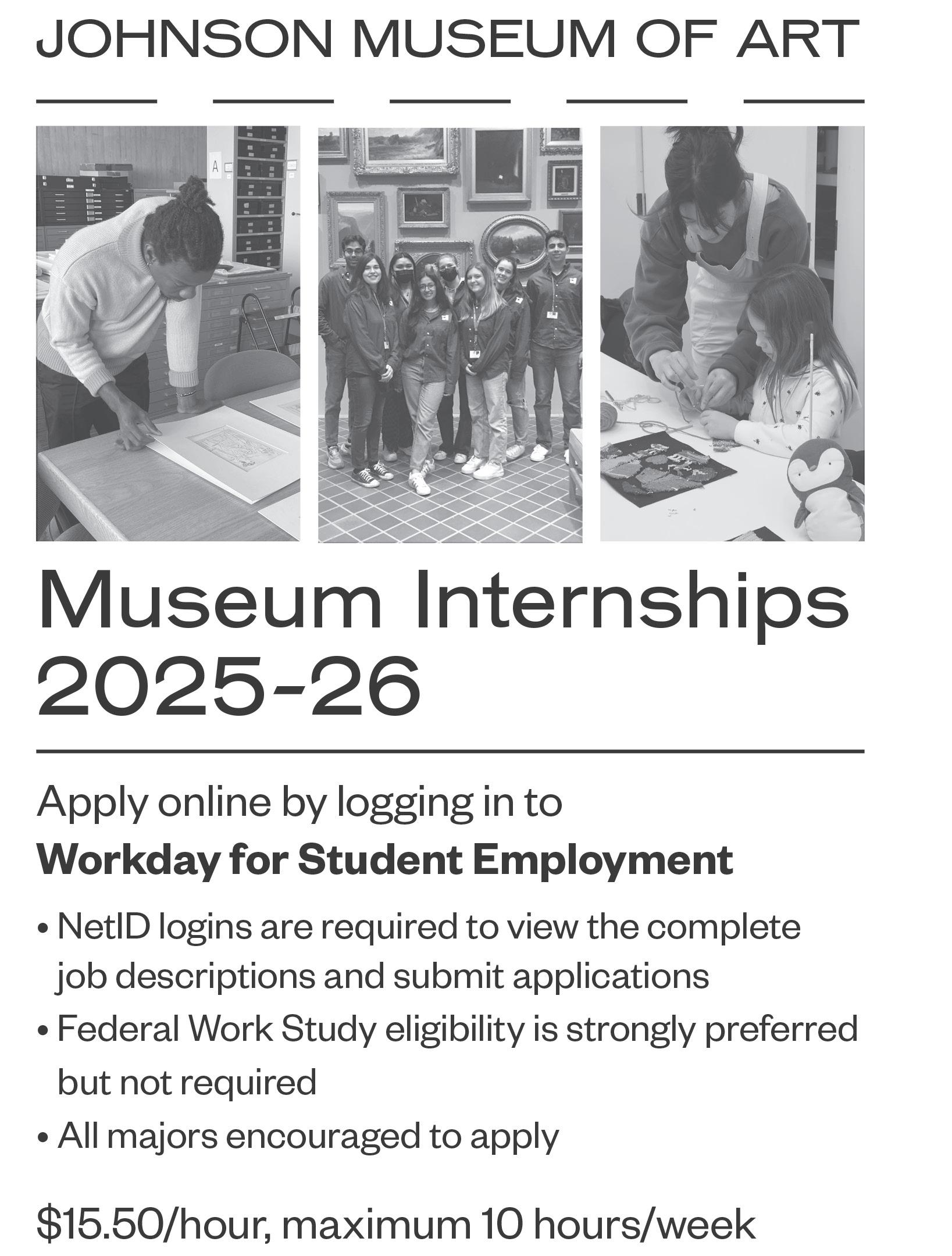

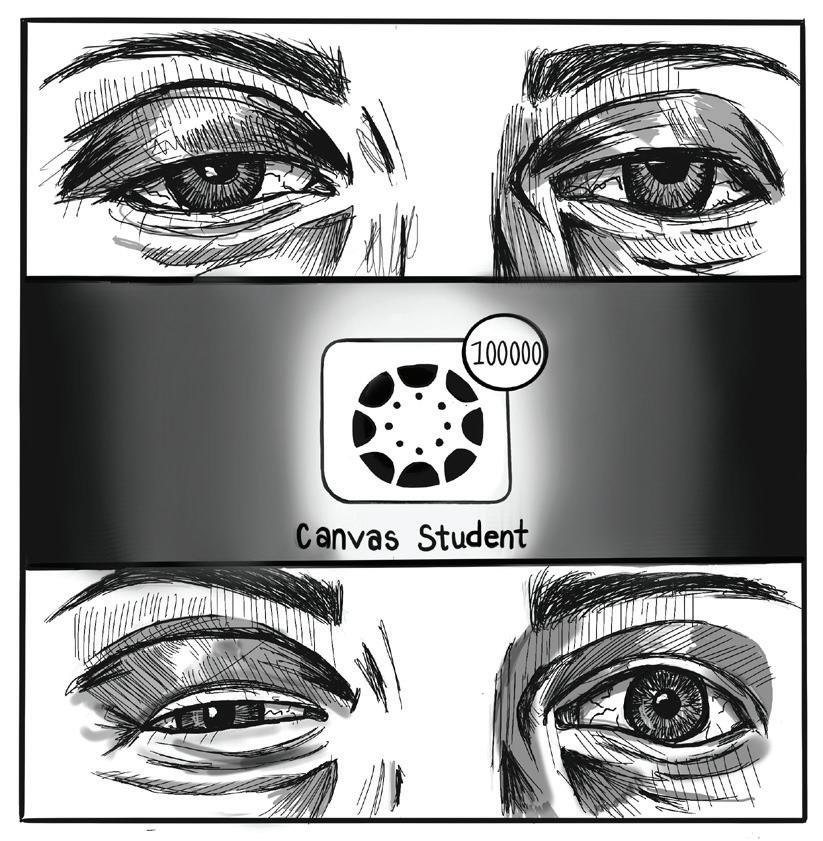
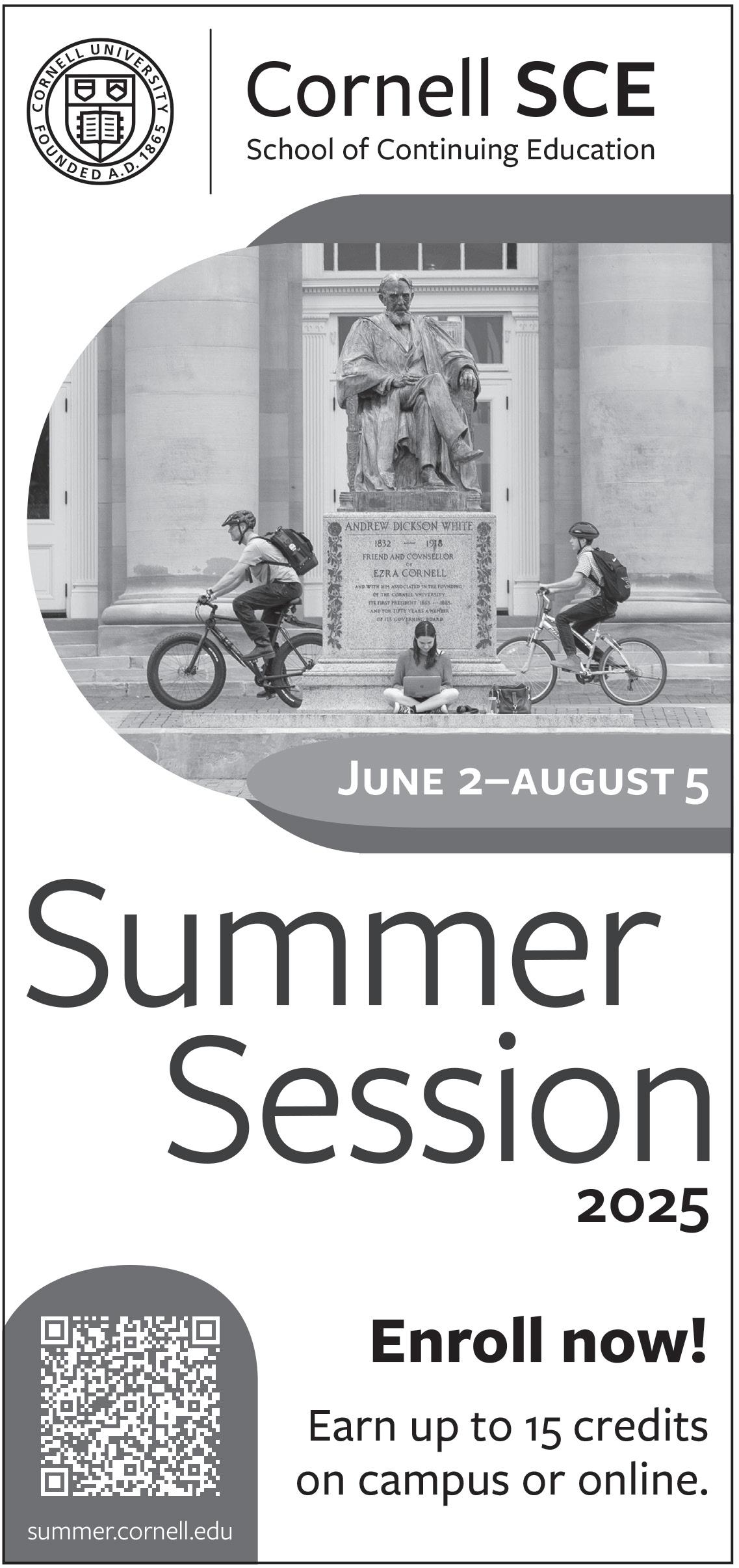

Ads are accepted at The Sun’s office at 139 W. State Street downtown, by phone or e-mail. Deadline: Noon at The Sun’s office two days preceding publication.
Standard Rate: $3.95 per day for first 15 words, 39 cents per day per word thereafter. Five or more consecutive insertions, $3.70 per day for first 15 words, 37 cents per day per word thereafter.
Commercial Rate: $5.95 per day for first 15 words, 40 cents per day per word thereafter. Five or more consecutive insertions, $5.75 per day for first 15 words, 38 cents per day per word thereafter.
The Sun is responsible for only one day makegood on ads.


By PAULINA DELGADO Arts & Culture Contributor
While you reflect on your break, regardless of where you went, I’m sure you’ve brought with you a remnant of your travels. Maybe it’s some sand in your tote bag, tan lines (or a sunburn, that’s okay too) or even a souvenir you’ve since put up on your shelf— you’ve inevitably returned familiarized to a culture you potentially hadn’t interacted with before. As we make our return to campus, you may have a lingering feeling that you hadn’t gotten to know the place you visited well enough— and that’s okay! A week is barely enough to scratch the surface of what an entire country has to offer. That being said, I invite you to stay curious about the culture you’ve just witnessed and take the time to learn and answer any questions you may have as you settle back into your routine.
As for me, I spent my Spring Break back home in Puerto Rico. A vacation destination for many of you is, alas, my home sweet home. Thus, I offer my unique perspective as a local to keep you, fellow tourists, in touch with the culture you’ve just experienced, as well as some tips on how to keep your visit as respectful as possible. Puerto Rico is a stunning Caribbean island that has gorgeous beaches, a vibrant night-life and many architectural gems; however, it’s important to recognize its rich history of complex political issues, including the colonized status of the island and current displacement disputes among land developers and locals— and most importantly, you must remember that it’s not just a
destination, it’s a home to many. This is partly why, when visiting Puerto Rico, you should be mindful that you’re a guest on the island, practice ethical tourism, and give back locally! I’d like to point you to an article written a few years ago by Cornell alum Claudia León for The Sun, where she dives into the complexities of ethical tourism in Puerto Rico— I encourage you to give it a read.
If you loved visiting PR but a week just wasn’t enough for you, I’ve compiled an array of song recommendations that’ll prolong your trip’s delight into the last few weeks of spring semester. These songs span genres such as salsa, reggaetón/trap, indie pop/alternative, bolero, reggae, psych rock, electronic and protest ballads. This selection is in Spanish, so whether you’re fluent, learning or here for the vibes; I promise the rhythm will speak for itself— no subtitles needed.
“Oh, Qué Será?” By Willie Colón
Originally written by Chico Buarque, Willie Colón’s 1981 version of “Oh, Que Será?” is a nostalgic salsa track that sonically feels like a romanticized montage of a trip to Puerto Rico (ideally shot in 35mm.) The song itself deals with uncertainty as he asks himself repeatedly, “Que será?/ What could it be?”; it depends on your interpretation, but, for me, the lyrics deal with questioning what greater force drives people to be passionate and keep living… hint: it’s love.
“ El Apagón” by Bad Bunny
It was impossible to pick a song from Bad Bunny’s perfect summer album Un Verano Sin Ti, however, it’s undeniable that this song does it all. It’s simultaneously a club anthem that mixes several
musical genres –reggaetón, bomba and house– while commenting on the displacement of native Puerto Ricans due to US colonists, as well as other socioeconomic issues (“apagónes/blackouts”). Ironically enough, it’s the only song in this line-up you could “frat-flick” to. “Lejos de Ti” by The Marías Found on The Marías album Submarine, “Lejos de Ti” translates to “Far From You”. The song opens with a hazy “underwater” sound of dissonant guitar plucking before bursting into the full force of a cathartic chorus. In this song, the lead is calling out to her lost lover, pleading for him not to forget her even though a great distance separates them. I like to think of this song as a metaphor for being far away from Puerto Rico, in a cold and distant place— much like this chilly April we’re having in Ithaca. So, if you’re ever scrolling through your spring break pictures and missing the tropical weather, just know María Zardoya misses it too.
DeBÍ TiRAR MáS FOToS by Bad Bunny
The hardest decision I had to make on this list was deciding which DeBÍ TiRAR MáS FOToS song to include… which is why I decided on the whole album! This album is an outstanding body of music that celebrates Puerto Rican culture from top to bottom. Just giving this album a listen will give you a solid introduction to the vast musical genres of Puerto Rico. Some of my favorites are: EoO, LO QUE LE PASÓ A HAWAii , DtMF, BAILE INoLVIDABLE and TURiSTA (which has an incredible music video that comments on guest’s manners, or
lack thereof, in AirBNB’s… subtle shade intended).
Durmiendo by Chuwi, Mayagüez by Los Walters, Los Perros Van Al Cielo by Epilogio, Un Millón by The Marías
These are my sunset/late-night driving songs that share a wistful, warm, surreal and dreamy tone. They feel like a drive back from the beach, windows down, maybe a few of your friends have been rocked to sleep by the breeze in the back of the car, but those that have managed to stay awake are vibing to the music and staring out at a beautiful sunset— sharing a reflection of life, love and loss.
Some very honorable mentions that 100% deserve a listen are:
“La Complicidad” by Cultura Profetica “Hijos del Cañaveral” by Residente “LOKERA” by Rauw Alejandro “Latinoamérica” by Calle 13, Feat. Totó la Momposina, Susana Baca & Maria Rita
DATA by Tainy
Los Rivera Destino Cosa Nuestra by Rauw Alejandro “Ojos Color Sol” by Calle 13 feat. Silvio Rodríguez
“Tu Ritmo” by Eladio Carrión “Olas y Arenas” by Sylvia Rexach and Tuti Umpierre “Brujería” by El Gran Combo
If any of these songs sound interesting to you, visit www.cornellsun.com for a full playlist.
By BASIL BOB
Arts & Culture Contributor
“You know that stuff’s fake right?”
A pro wrestling fan cannot go long before encountering this phrase. Whenever anyone brings up their enjoyment of pro wrestling, someone invariably reminds them and everyone else that wrestling is not a real sport, that the outcome is indeed predetermined. The accuser typically brings this totally shocking revelation to display their superiority over the wrestling fan, that pro wrestling is somehow lower or beneath them. For the accuser, the “fakeness” of wrestling disqualifies it from being legitimate entertainment, and anyone who watches wrestling must be an idiot who thinks it’s real.
To be frank, this is a ridiculous argument. For one, we have known that wrestling is predetermined since at least 1989, with then-WWE owner and monster Vince McMahon admitting so to the New Jersey Athletic Control Board to get around regulation. Secondly, and more importantly, why does this matter? We watch movies and TV shows knowing they are fake, yet it doesn’t stop us from suspending our disbelief. The fact that Star Wars is predetermined does not stop anyone from enjoying the movie, so why should it stop us from enjoying wrestling?
It is quite strange that wrestling fans feel the need to defend themselves as pro wrestling remains immensely popular.
Pro wrestling is a highly lucrative form of entertainment, with its biggest promotion, WWE, raking in $1.3 billion last year. Wrestlemania 41, set to conclude on Sunday in Las Vegas, is one of WWE’s most valuable events of the year, generating millions as the biggest night in the WWE calendar. If the wrestling fans are not satisfied with WWE’s product, they can turn to the upstart competitor AEW, which sees more than a million TV viewers weekly on HBO Max. You are not even limited to the United States as a wrestling fan, with Japan and Mexico boasting a long and storied pro wrestling legacy. Yet, I and many others cannot help but hide our enjoyment, feeling this sense of shame at simply enjoying this product, having to constantly be on the defensive against people who can’t help but remind us that, shock and awe, wrestling is fake.
Now I must admit, the accusation that pro wrestling is stupid isn’t always wrong. Wrestling has featured some of the most asinine, ludicrous, and offensive storylines and characters ever to come out of a writers’ room. We are not at a loss for terrible wrestling, its history providing us with a treasure trove of some truly befuddling television. Rey Mysterio had a match against the late-great Eddie Guerrero over custody of Rey’s child, Dominik. Perry Saturn fell in love with a mop. Mae Young literally gave birth to a hand once. And this is not even close to the worst I could mention. But
below all this lies one of the most unique art forms known to man, a place where soaring athleticism mixes with some of the most well-acted narratives. It is not for everyone, but it can genuinely move and inspire us. Pro Wrestling is an art form that millions around the world across different generations have fallen in love with, which continues to captivate viewers to this day.
In describing wrestling, I must defer to pro wrestling legend Jesse Ventura: “Wrestling is ballet with violence.” Like ballet, a wrestling match aims to tell a full story with little use of words, creating a narratively satisfying beginning, middle and end. Like ballet, it is a highly technical performance form, with wrestlers having to realize a complete story purely through physical performance. Though wrestlers coordinate with one another to ensure safety, it is still a physically daunting task, requiring years of training to do properly. Yet it is in this physical performance that the wrestler can embody a whole range of personas, ranging from the hero to the villain and everything in between. Thus, a wrestling match is the telling of these narratives, the establishing of a story with certain conflicts that must be resolved through violence.
Beyond individual matches, pro wrestling has a strange relationship to reality, one not found in any other medium. Though most of us know wrestling is scripted, characters operate under this fascinating illusion of reality known as
“kayfabe.” It is what keeps wrestling as a kind of live theatre and not a “real” competition like the UFC, allowing for comedy, drama, horror and all genre forms into it. Yet because of wrestling’s long-term storytelling and its nature as live performance, there are times when the “kayfabe” of wrestling bleeds into reality. We watch as these wrestlers and their fictional personas grow old in real time and, at some point, the line between the wrestler and their persona blurs. This blurring is why CM Punk’s pipebomb promo is so legendary; he spoke on real issues the man playing CM Punk had while working at WWE, promising to leave with the WWE title if he won it against John Cena. It is truly worth a watch, as he essentially breaks the fourth wall as both CM Punk and the character’s actor Phil Brooks. This promo gave that match a real dimension alongside the “kayfabe” story, with the subsequent match regarded as one of the greatest in WWE history. Only in wrestling do we have this kind of storyteller. Only in wrestling can we get this sort of character development, where performance and reality can coexist in the squared circle. I truly understand that wrestling is not for everybody. But there is a reason why people love it so, and I implore anyone in search of something unique to give it a try.
Basil Bob is a sophomore in the College of Arts and Sciences. He can be reached at bob27@cornell.edu
of 2014.”
Come one, come all to witness this year’s Slope Day artists: headliner Kehlani and special guest Louis the Child! For most Cornellians, Slope Day is a time of celebration, when the dreary cold and academic stress melt away, giving rise to a vibrant renewal of springtime energy. It’s a day when the campus blooms with music, excitement and collective school pride that buzzes through the crowd. This year is no different. So, consider this your guide — an introduction to the cultural significance and artistic impact that each of our incoming performers bring to the hill.
Kehlani Ashley Parrish was born on April 24, 1995, in Oakland, California. Her early life was shaped by adversity; her father passed away when she was a child, and her mother struggled with drug addiction. As a result, Kehlani was adopted and raised by her aunt. During this time, she was introduced to R&B and neo-soul, listening to artists such as Lauryn Hill, Erykah Badu and Jill Scott, who would later influence her musical development. At the age of 14, she became the lead vocalist for her local band “Poplyfe.” By 19, she would release her debut mixtape, Cloud 19 , which gained traction on SoundCloud and was later recognized by Complex magazine as one of the “50 Best Albums
After releasing her first mixtape, her artistic sound started to develop, a sound that all Kehlani diehards know to be intrinsically and uniquely hers. Known for her soulful voice, conversational singing style and cutting lyricism, her sonic identity is marked by her influences — characterized by a blend of R&B, pop and hip hop, with a unique neo soul influence. This culminates in her most recent release, Crash. Her impact on the music industry has not gone without notice, garnering five Grammy nominations and three albums in the Billboard Top 10. Outside of the industry, Kehlani has been open since the start of her career about her sexuality and gender identity. She continually advocates for queer spaces and identities. Kehlani is an artist whose presence in the music industry opens doors for other queer artists of color; showing the industry and general culture the beauty in diversity and that queer and gender identities cannot and will not be ignored. Her performance on the Hill will mark a musical creative presence, but also an advocate for aspects of identity that make us all human.
Louis The Child, the electronic music duo composed of members Freddy Kennett and Robby Hauldren, was started while both were attending New Trier High School. Their name, inspired by a randomly selected Wikipedia page, reflects the duo’s
spontaneous spirit. Both artists began creating music in their youth, experimenting with digital audio workstations like Logic Pro and Pro Tools. Kennett also had a grasp of music theory and gave thanks to his friends in jazz, whom he notes helped in the creation of his music. Louis the Child is mainly inspired by rock, hip-hop, indie and EDM, citing influences ranging from Jimi Hendrix, Kanye West and Kid Cudi to Deadmau5 and Skrillex. All of their influences can be heard in their genre-bending approach to the EDM space. The band first gained notoriety while Kennett and Hauldren were still in high school, following the release of their single “It’s Strange,” which peaked at number 38 on Billboard’s Electronic Songs chart on Oct. 31, 2015. The song also garnered praise from notable industry staples such as Taylor Swift, who included it in her “Songs That Will Make Life Awesome” list.
After breaking through, their sound continued to develop. Louis the Child is now known for distinctive future trap synths, melodic landscapes and a pop vibe. From conception, Kenneth and Hauldren always had a tight-knit relationship with their fans — whether directly communicating with every Twitter comment or constructing an album based on what they believe the world could use right now. Their latest release, The Sun Comes Up , explores not being entirely against the hardships of
life but, instead, embracing life’s adventures despite lows. They wanted their audience to feel the childlike joy they felt when creating the record, which is apparent through the sonic qualities and lyricism. This connection to the audience is what allowed Louis the Child to gain footing in the ever-evolving landscape of the music industry. The band is a testament to the fact that music can be and accomplish many things, born from many influences and experiences themselves. Kenneth and Hauldren show that music can be used to build connections not only between the audience members themselves, but also between the artist and audience.
This Slope Day, when you are cheering on our performers and dancing with your friends, you are now equipped not only with the tools to prepare for the sonic arrangements by each of these artists, but also with an understanding of their influence on their fanbase and on the larger culture as a whole.

A meet cute. Those first sparks. Infatuation as a high like no other, like wanting to get to know everything about a person, like wanting to turn them inside out and understand, really, everything that makes them who they are. I’m not an expert on the feeling, but I’d be lying if I said I’ve never experienced anything like it.
When I first heard Bon Iver’s “SABLE, fABLE” I didn’t expect it to be an album about love — or, more accurately, obsession. Originally released in Oct. 2024, Bon Iver’s three-song EP “SABLE,” struck me as absolutely introspective; raw, sparse and inexplicably vast in sound, “SABLE,” sang of self-realization and acceptance. Beautifully orchestrated and emotionally evocative, it was one of my favorite albums of the year. Although “SABLE, fABLE” is technically one album — with “SABLE,” making up Disc 1 of the 13-song, 41-minute long runtime — there could not be a greater emotional dichotomy between discs 1 and 2 of the album.
If “SABLE,” was Bon Iver’s journey to self-acceptance, “fABLE” is the product of that newfound
confidence. A rebirth in its own right, “fABLE” sings of a new perspective manifested in the idea of romantic love. “fABLE” itself is upbeat, elaborate, and pop-y — a drastic sonic turnaround from “SABLE,” which leaned more heavily into Bon Iver’s folk roots.
Although Disc 2 holds its own as a solid pop album, it doesn’t quite measure up to the expectation that “SABLE,” set, trading depth for extrospection and rawness for an overly-produced pop sound.
We are given a mellow introduction to “fABLE” in “Short Story,” the first track of Disc 2. Stripped down instrumentally, it follows in the same sparse yet orchestral quality that defined “SABLE,” and creates a smooth bridge between the two discs of the album. As the song ends, we are met with a steady synth beat that leads us into track 2 of disc 2, “Everything is Peaceful Love.” Originally released as a single, “Everything is Peaceful Love” serves as the emotional pivot of the album. With a fast synthetic drum beat backing elaborate horns, the song builds excitement; it is the initial meeting — childish innocence, giddy anxiety. “And damn if I’m not climbin’ up a tree right now / and everything is peaceful love, and
right in me,” Bon Iver sings. It’s sweet — if not a bit saccharine — in its innocent rhymes (“trippin’, slippin’, rippin’, limpin’, blinkin’”) but the song itself works. It’s a cute way to change the tone of the album and, all around, inoffensive.
With “Walk Home” begins the progression of a relationship. Languid and low-key, Bon Iver sings of the intimacy and peace provided by a sexual relationship. The lyrics are straightforward and sensual — two adjectives not usually associated with Bon Iver’s music — making the song somewhat of a refreshing change from their usual style: “Walk home/” the chorus goes, “Wanna be inside with you.” It is a simple song and a nice addition to the album. Again, all around, rather inoffensive — a trait that will come to define the album.
All the songs on disc 2 of “SABLE, fABLE” are decent. The theme of love is cohesive, and the album itself flows like a love story. It flirts with a multitude of genres, dipping into RnB, pop and folk, so it doesn’t make a boring listening experience. Yet something is missing.
As we traverse from disc 1 to disc 2 of the album, we trade lyrics like “As you live and breathe / I really know
now what had hold on me” and “Oh, but maybe things can change / What can wax can wane” for lyrics like “Keep the sad shit off the phone / and get your fine ass on the road” in “I’ll Be There.” It’s a jarring change of pace and, frankly, corny when considered in the context of the three songs that make up “SABLE,.” Don’t get me wrong — I love the concept of this album. I love the innocence in the rebirth narrative. I love the excitement palpable in the layered instrumentation and dreamy synths, with “If Only I Could Wait” being a perfect example of the genius in Bon Iver’s arrangements. I love the romance and sensuality of some of the lyrics, such as “But if only I could pray/ in the blaze of a northern bar/ I’ll bend another straight/ we’ll decay in other ways now” in “If Only I Could Wait.”
In fact, the three songs that make up the ending of the album — and the subsequent bittersweet ending of a relationship — are by far my favorites on the track. “There’s a Rhythmn” has a lofi-esque quality to it, and, combined with some of the most beautiful and least cheesy lyrics on the album, serves as a serene yet hopeful ending of the story. And, with no lyrics at all, “Au Revoir” is a beau-
tiful, atmospheric last track that combines melancholy with contentment. But the other songs in “fABLE,” while, again, inoffensive, are forgettable and awkwardly placed in conjunction with the sparse and gorgeous “SABLE,.”
Perhaps my review of this album is a bit close-minded. After all, Bon Iver is known for his melancholic cabin-folk, and, frankly, that is what I’ve come to expect from him. I appreciate his attempt to break the formula with this album, and I find the pipeline between self-acceptance and romantic love appealing. And I love how he returns to form at the end of the album, turning the story back inwards, giving the lyrics more depth. However, I can’t help feeling disappointed by the bluntness of the lyrics (I like my music a bit pretentious), the overuse of synths and the lack of vocal emphasis in the second disc of “SABLE, fABLE.” But, then again, perhaps that’s indicative of the human experience. After all, “fABLE” is a love story, and, in the end, all love stories are a little bit awkward and a little bit innocent. That’s what makes them so pure, after all.
Yaelin Hough is a freshman in the College of Arts & Sciences. She can be reached at yhough@cornellsun.com.
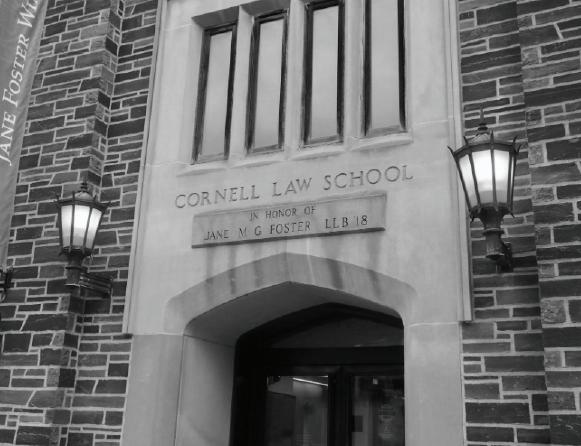
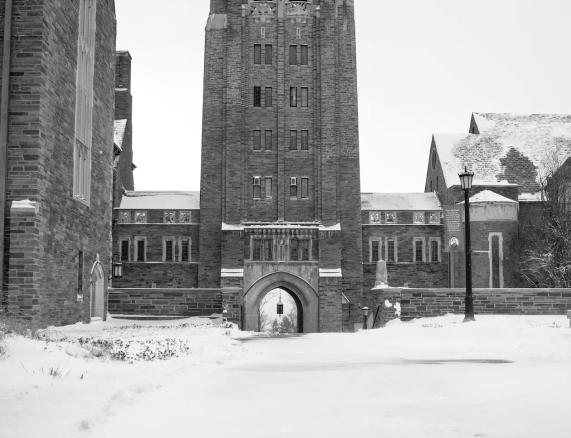
By EVELYN MULLEN WALSH Sun Contributor
April 8 — Cornell Law’s 3+3 Accelerated Pathway Scholar Program allows a selective number of undergraduates from Cornell, Hobart and William Smith Colleges and St. Lawrence University to complete their final year of undergraduate study during their first year of law school.
According to the Cornell Law School website, approximately 7 percent of the Cornell Law Class of 2027 came specifically from the 3+3 program.
Unlike the general law school application process, 3+3 applicants are encouraged to apply by January of their junior year. Rather than submitting the LSAT, Cornell undergraduates submit an SAT or ACT score, and are exempt from the $80 application fee.
The Sun interviewed three recent 3+3 program admits, who will be entering Cornell Law School’s Class of 2028 in the fall. The three spoke about their academic backgrounds, legal interests and application experiences.
Felipe Lopez ’26, Nolan School of Hotel Administration
Felipe Lopez ’26 is a student in the hotel school, interested in pursuing corporate law or working for the federal government. Lopez comes from a financial background, having interned at both Bank of America and EY, and is a Rawlings Presidential Research Scholar.
While Lopez knew of the 3+3 program when he entered Cornell as a freshman, it was not until the end of his first year that he became serious about pursuing the program. Lopez said he would still have been interested in attending Cornell Law without the accelerated program, though he lauded the value of the program, as well as the value of a law degree when pursuing a government career and as an additional resume credential.
“I think 3+3 is just really good bang for your buck, for lack of a better word.”
Felipe Lopez ’26
“I think the 3+3 is just really good bang for your buck, for lack of a better word,” said Lopez. “If you do the net present value analysis of saving one year of tuition and one year opportunity cost of getting to work earlier, and then no LSAT, it works out to like hundreds of thousands of dollars in savings.”
Lopez said the law school’s admissions office and his own writing professors were useful resources throughout the application process.
When discussing what he did not like about the application process, Lopez mentioned the requirement that 3+3 applicants needed to
complete their degree requirements in three years, and the specific challenges that the extensive Hotel Administration degree requirements provided. Lopez had to take summer classes for two summers as well as a winter class in order to complete his degree requirements within three years.
“Basically, the whole premise is you have to finish all your degree and major requirements in three years. So for us, that means about 116 [or] 117 credits… versus, if you’re a government [major in] Arts and Sciences, you can get that all done in like 50 to 80 credits,” Lopez said.
Overall, Lopez recommended that students interested in the 3+3 program make a decision early on in their Cornell careers — especially if they are in the hotel school.
Olivia Hosie ’26, Nolan School of Hotel Administration
Olivia Hosie ’26, currently enrolled in the hotel school, first entered Cornell as an Animal Science major but discovered she missed the human connections she experienced while working as a restaurant server in high school.
“I truly enjoyed forming connections with the people that I was serving … and providing them meaningful experiences,” Hosie said. “So that sparked me into transferring to the hotel school and exploring that interest in hospitality,” Hosie said.
“For me Cornell was never really a question. I always wanted to just stay here.”
Olivia Hosie ’26
After learning of the 3+3 program from a classmate in the spring of her sophomore year, Hosie spoke with Cornell Law’s dean of admissions as well as current Cornell Law students to discuss pursuing a legal career.
These meetings solidified her interest in continuing her education at Cornell Law School and participating in the 3+3 program. Her internship with Sonesta Hotels during her sophomore summer reinforced this desire.
When asked why she wanted to pursue the 3+3 program, Hosie spoke of her love of Cornell and her classmates here. The small size of Cornell Law appealed to Hosie, which reminded her of the small, close-knit community she found at the hotel school.
“You know everyone that you’re sitting in class with and they’re very supportive of you … and I think that I truly do thrive in these environments where I do get to know my classmates on a personal level,” Hosie said. “For me Cornell was never really a question. I always wanted to just stay here.”
Hosie encouraged interested students to explore their interests and speak with relevant
individuals to ensure they truly want to do it.
“If it is what you want to do, just follow your heart and you can do anything that you put your mind to,” Hosie said. “Just believe in yourself.”
Matthew Mah ’26, School of Industrial and Labor Relations
Matthew Mah ’26, who studies Industrial and Labor Relations, transferred from The George Washington University and is a Meinig Scholar.
Mah discovered the 3+3 program while researching Cornell programs before he arrived on campus as a sophomore. He decided to pursue law after taking Labor and Employment Law taught by Prof. Gali Racabi, industrial labor relations, and getting a job as an IT assistant at Cornell Law School.
“Once I experienced the community at Cornell Law, I was very much like, ‘This is where I can see myself in a few years.’”
Matthew Mah ’26
“Once I experienced the community at Cornell Law, I was very much like, ‘This is where I can see myself in a few years,’” Mah said. “I feel like if I didn’t at least apply to it, especially with the feeling that I wanted to be there, I would, in five years, look back on this moment and be like I really regret what happened.”
Reflecting on the application process, Mah was grateful for the advice he received from past 3+3 candidates on the application process and what to expect throughout, as well as seminars held by the law school which provided information about the 3+3 program.
Mah also commented on the fear of being “pigeonholed” into a social circle of only other 3+3 students once at Cornell Law, which he was warned sometimes happens by a current law student.
Ultimately, Mah recommended that students only pursue the 3+3 program if they are genuinely interested, and not for the prestige of the program or the legal profession. He emphasized that the 3+3 program is not the only path to success and to avoid viewing other students as competition.
“You really want to appreciate the community around you, even if it’s the case where you’re technically competing, don’t think about them as competition, think about them as peers,” Mah said. “There’s abundance here. There’s enough for everyone to succeed.”

By RAFAELA GANDOLFO BUSTAMANTE Sun Senior Writer
April 14 — Bailey Hall resounded with rhythms and beats as Cornell Yamatai presented Pulse 2025: Reflections, a 14-song production that encapsulated their annual Taiko drumming performance.
Taiko, meaning “drum” in Japanese, is a traditional style of Japanese drumming rooted in Buddhist and Shinto religions. Though the practice is a historical form of classical art, it has recently modernized to over 4,000 groups across North America.
The 26 members of the University’s only Taiko drumming ensemble were accompanied by guest performer Miyako Seki, a member of the professional Japanese Taiko group Bonten who travelled to Cornell from Japan to perform. Together, the ensemble performed a fiery two hour long show.
The production comes to life after weeks of preparation, beginning at the start of the 2025 spring semester, according to the co-publicity chair Emmah Kabbah ’27.
“[We rehearse] up to four times a week — sometimes over 15 hours,” Kabbah wrote in an email to The Sun. “It’s been a true test of discipline and teamwork. … Our 26-member team has poured their heart, time, and energy into making this show unforgettable.”
“It’s been a true test of discipline and teamwork. ... Our 26-member team has poured their heart, time, and energy into making this show unforgettable.”
Emmah Kabbah ’27
The songs ranged from solos and duets to small and large group pieces, comprising varying styles, movements and volumes. Similarly, dynamic energy was created throughout the production, with some compositions being done lying down, while others required spins, jumps and dances. Apart from the music itself, the cast members were illuminat -
ed with changing lighting that aligned with the feeling of the music. The stage radiated striking dark red hues that quickly changed to dark or bright lighting based on the beats and flow of the songs.
Following “years of scaled-down performances due to COVID,” the club has felt rising turnout throughout the years. With over 800 tickets sold for their Saturday performance, according to Kabbah, Yamatai’s momentum is growing increasingly stronger throughout the years.
“It’s really interesting how the Japanese drumming is so powerful. For those two hours, it’s really enjoyable.”
Laura Ren ’27
Brenda Calhoun, an Ithaca resident, attended with a friend and found herself cheering and energized.
“I love to support people in the neighborhood. When [there are] events like this, it’s good to get out,” Calhoun said. “I thought it was awesome. This is my first time being here and I’m enjoying myself.”
Yamatai’s final piece involved every member in the club, making for a triumphant conclusion that echoed throughout Bailey Hall. Laura Ren ’27, who takes an interest in the art and has auditioned for the group twice, was enthusiastic about the performance and culture.
“I thought it was awesome. This is my first time being here and I’m enjoying myself.”
Brenda Calhoun
By ANJELINA GONZALEZ Sun Senior Writer
April 11 — In its fifth year hosting the conference, TEDx Cornell invites guest alumni and student speakers to take the stage at Statler Auditorium at their annual conference on Saturday.
Ella Hough ’25, Alexander Htet Kyaw ’23 and Julia Dunetz ’19 were chosen by the speaker curation team to “encourage [the] community to challenge their beliefs, to gain awareness of new ideas, and to think more deeply and critically,” according to the TEDx Cornell site.
The theme “Uncharted” refers to the conference’s spotlight on the speakers’ initiatives in “redefining what’s possible.”
Ella Hough ’25, “In Yourself You Trust”
Hough is a junior fellow studying cognitive science at the Cornell Brooks Tech Policy Institute. She founded the Cornell Bitcoin Club and is part of the College Scholars Program.
Through a speech presentation, Hough will encourage Gen Z to take control of their futures and finances on Saturday.
“Our world is changing alot. We’re not going to do things the way we’ve always done them.”
Ella Hough ’25
For Hough, educating others on Bitcoin is part of the solution, and a focus of her speech.
“Often we hear the phrase, ‘time is money.’ But I don’t think when many of us go deep into what that phrase means, or truly what money is,” Hough said. “I think it’s important for people to start asking these questions.”
In uncertain situations, Hough said she hopes that her audience will believe in themselves to find a solution instead of outsourcing to others. At the heart of her speech, Hough said she wants to inspire Gen Z to feel empowered.
“Our world is changing a lot. We’re not going to do things the way we’ve always done them,” Hough said.
Alexander Htet Kyaw ’23, “Design and Make with Artificial Intelligence, Augmented Reality, and Robotics”
In pursuit of a master’s degree, Kyaw currently studies electrical engineering and computer science at MIT, having majored in architecture and minored in information science at Cornell for his undergraduate degree.
“My talk is mainly about how we can collaborate with automation and how automation plays a role in how we actually use machines,” Kyaw said. “And it’s not about technologies replacing us,
but how we can use them to make things that are different from what we could have done before.”
For Kyaw, collaboration between humans and machines expands design and making. Through AI, AR and robotics, he believes these collaborations can be used for writing and other activities in the surrounding world.
“I think there is no one right answer to like how we approach this technology,” Kyaw said.
“I think there is no one right answer to like how we approach this technology.”
Alexander Htet Kyaw ’23
Kyaw’s speech will highlight a variety of examples, some with active participants in an automated scenario and others where participants take a passive role in the automation process.
Julia Dunetz ’19, “The Power of Storytelling: A Catalyst for Change”
During her senior year at Cornell, Dunetz received her first producer credit on Broadway for “Seawall/A Life.” Now, the alumna focuses on theater production, notably winning a Tony award for co-producing a revival of “Parade” in 2023.
Dunetz’s speech focuses on the potential impacts of storytelling in making the world a better place, a concept that she feels is not yet commonplace.
For “uncharted times,” Dunetz suggests using narrative to change culture.
“I think my message is important to
“Especially in the age of social media and division and so much polarization, finding ways to have compassion and empathy for those around us feels paramount.”
Julia Dunetz ’19
share because we have to find ways to better see each other right now,” said Dunetz. “Especially in the age of social media and division and so much polarization, finding ways to have compassion and empathy for those around us feels paramount.”
Cornell students can attend the TEDx Cornell’s 2025 Annual Conference in Statler Auditorium at 2 p.m. on Saturday by purchasing tickets on Vivenu. Hough, Kyaw and Dunetz will connect technology, storytelling and Bitcoin in three distinct speeches looking into untouched spaces.
Anjelina Gonzalez can be reached at agonzalez@cornellsun.com.
“This is my second time coming to Pulse,” said Ren. “It’s really interesting how the Japanese drumming is so powerful. For those two hours, it’s really enjoyable”

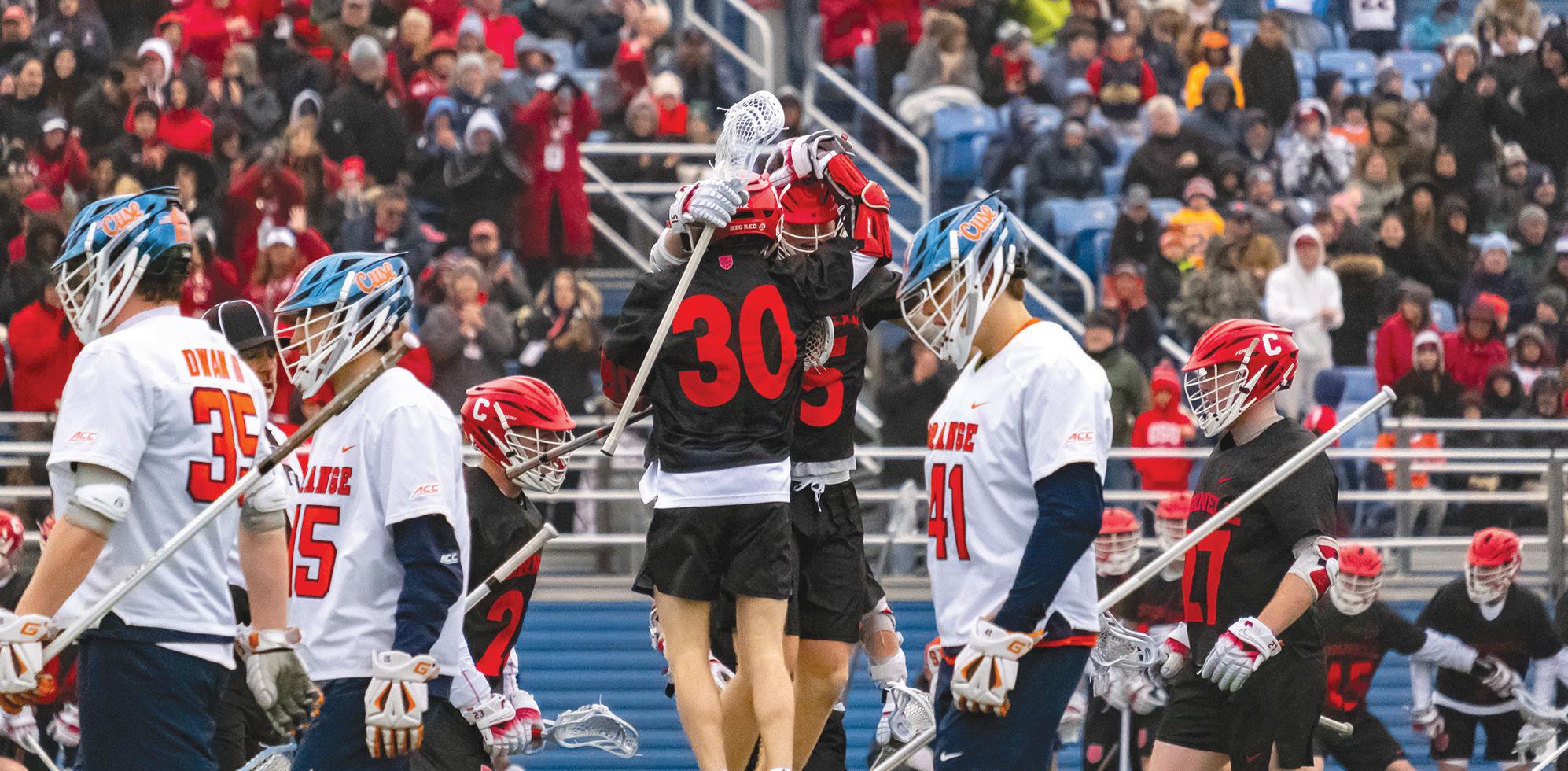
By WILLIAM CAWLEY and ALEXIS ROGERS
The standout attackman. The offensive depth. The dominant faceoff. What makes No. 4 Syracuse University great may also describe what has given No. 1 Cornell its success this season. What made the difference when they went head-to-head?
“It‘s execution,” said head coach Connor Buczek ’15 prior to the weekend. “This is as close to a playoff atmosphere as we get in the middle of the season. It’s going to come down to execution.”
The unique “atmosphere” of the Red-Orange meeting was a product of a change of scenery. This year, the battle between upstate rivals moved to a new stage: Mitchel Field in Uniondale, New York.
Despite unusual territory, the Red pulled ahead of the Orange and didn’t
let up. In a show of its adaptability and power, Cornell (10-1, 4-0 Ivy) sent Syracuse (9-3, 2-0 Atlantic Coast Conference) packing and won the match 17-12.
The game started slow, the first goal coming over six minutes in. It was scored, of course, by senior attackman CJ Kirst, his 50th of the year. This goal opened the floodgates and the first quarter ended with Cornell in a 5-2 lead.
Cornell pushed its lead to six late in the second quarter, but Syracuse was able to rally. Halftime came with Cornell still in the lead, 9-5.
Syracuse continued its push to start the second half, cutting the lead to two. Cornell then got on a run of its own, scoring four straight. Syracuse did not give up though, and had its own four goal run to close a third quarter with 10 total goals between the two teams.
Cornell opened the final quarter with a 13-7 lead and, behind two quick goals from sophomore attackman Ryan Goldstein, would hold this lead. The Red allowed the dangerous Syracuse offense just one goal in the final frame.
The game ended as a 17-12 victory for Cornell — upholding its No. 1 national ranking.
Kirst led the way for the Red, notching eight points on five goals and three assists. Kirst is now six goals away from breaking the all-time National Collegiate Athletics Association goals record. The record is currently held by Payton Cormier, who scored 224 goals in five years at the University of Virginia.
Goldstein also had an outstanding game, match Kirst’s eight points with three goals and five assists. He also picked up four ground balls.
Senior goalkeeper Wyatt Knust
again held it down in goal for the Red, saving 14 of 26 shots on goal for a .540 save percentage. Junior faceoff Jack Cascadden had another great game, winning over half of his draws against John Mullen, the player with the fifth best faceoff win percentage in the country. The Cornell backup struggled again, with freshman Michael Melkonian not winning either of his two draws.
Cornell will now look forward to its matchup against another top 10 opponent, Harvard University. A win against the Crimson would mean that Cornell is guaranteed to host the Ivy League tournament.
The game will be played in Cambridge at 12 p.m. on Saturday, April 19. Coverage will be available on ESPN+.
William Cawley and Alexis Rogers can be reached at wcawley@cornellsun.com and
By ZEINAB FARAJ Assistant Sports Editor
Roughly one year ago, the Cornell women’s polo team tied Grossmont College in the last minutes of the final chukker in during the Division II Women’s National Intercollegiate Championship game. Unfortunately, the Red’s four-goal comeback in the second half fell short as Grossmont secured the game-winning goal that ultimately halted Cornell’s hopes of the Division II title for another year.
“Last year we had an extremely upsetting loss that we all took pretty hard,” said senior Ava Ramachandran.
“To win nationals this year was a dream come true, and it
is a true testament to how hard we have worked this past year and how far we have come as a team in the last two years.”
On April 13, the team was down two points to the University of New Hampshire early on in the match — but this time were able to score the equalizer by halftime.
And this time the Red’s offense dominated in the third and fourth chukkers, going on a 5-1 scoring streak that ultimately sealed the game in Cornell’s favor and finally awarded them its long-awaited and first-ever Division II National champions title.
Ramachandran and junior Lara Chong combined for a total of 10 points and freshman Naomi Marlough scored four times.
“Lara and Naomi are two
of the most talented players I have ever met,” Ramachandran said. “I am so lucky to have such incredible team chemistry with Lara, Naomi and [fifth year] Isabelle [Braden].”
This season meant a lot to Ramachandran — not only because it was her final collegiate season, but also because she came off a wrist injury earlier on in the season.
“I remember at the end of the game, when the horn finally rang and we realize[d] we just won nationals, Lara looked at me and [said] ‘we did it,’” Ramachandran said. “There was this sense of relief and pure excitement, but also sadness because that was the end of my polo career.”
This was not the first time Cornell faced the University of New Hampshire. In fact, this
was the team’s third time beating the Wildcats this season. In the two earlier matchups of the season, the Red narrowly escaped New Hampshire, winning both matches by just one goal.
To even have the chance to face the University of New Hampshire on Sunday, the Red had to get past the University of Kentucky on Wednesday. In this match, the Red were up by two points at halftime and took a decisive lead during the third chukker, ultimately beating the Wildcats, 15-9.
Cornell also had history with Kentucky — beating them twice earlier this season.
Overall, Cornell finished its National Champs season with a record of 15-5, including a five game win streak to cap off this win.
Ramachandran was awarded the Women’s Sportsmanship Award, while Chong and Marlough were dubbed National All-Stars.
Next year, the Red are ready to tackle the season head on with goals of winning “regionals and nationals” to keep its reigning champs title.
“I know this team is going to continue to get better and better,” Ramachandran said. “[I want to credit] our amazing coaching staff, our work crew, team members who cheered us on and most importantly our horses who we owe the world to and wouldn’t have made this season possible without.”
Zeinab Faraj can be reached at zfaraj@cornellsun.com.
By
You’re getting conned. All of you. And no one will tell you that hard truth: You pay too much and use too little! Most of you probably don’t care, and that’s okay. Well, actually, no, it’s not. You should be embarrassed that you are not milking all that your tuition offers (and doesn’t). To solve this little (expensive) issue, I’ll share what I’ve seen (not person- ally done…) are the most effective ways to maximize your tuition.
1. Find a Cornell Alum that happens to also be a Sugar Daddy Ok, not sure if this has ever been done, but I think it’s an untapped market and resource. Everyone here blabs on and on about how you’re paying for the “connections” this school offers, so why not use them? If you’re repulsed by this idea, clearly you hav- en’t been committed enough to networking, and what a shame that is. I hope you consider this one, but just a warning! Check that they do not have legacy children… who could be at school…
cause that would be weird. For the straight men! Don’t you worry, I’m sure there are some interested alumnae who would take you under their wing… of their private jet! Best of luck!
2. Don’t be a Scaredy Cat: Dining Hall Hacks
If you’ve never snuck into the back of Morrison Dining because you have limited swipes or no meal plan, then I’m ashamed of you. That’s embarrassing! If you also ha- ven’t taken plates, utensils, cups, etc. from a dining hall you should probably start. If you have a moral issue with this one, you can kiss my ass. I have free forks and you don’t.
Here are some creative dining hall swipes: bowls, the big “Ken’s Essentials” salad dressing bottles, plastic cups, salt and pepper packets. And my last suggestion, one I am uncomfortable with sharing as I have personally swiped: soy sauce bottles. I won’t be giving further explanation.
3. Every Event Offered: For Free Shit
You should genuine- ly go to every event offered
by Class Councils, clubs, schools, etc. Why? Free food. Oh! Speaking of food, do not buy the ten-dollar Chick- fil-A sandwiches or two-dollar Krispy Kreme donuts or twenty-dollar Crumbl boxes. If you do, you’re an idiot. No matter what student is beg- ging you to buy it, no mat- ter how much you miss fast food, no matter if it’s cheaper than other food you’d buy in- stead. Don’t do it. It’s a statement.
Besides the best part, the food, they also occasional- ly have free Cornell-labeled dumb shit, such as but not limited to: notebooks, stress balls, pens, phone wallets, cups, cones — you get the gist. Go, and take all of the dumb shit. If you don’t want it, do it for me (just kidding, please don’t).
4. Get a Job?
I know this is a foreign concept, but you can get a job? On campus? Isn’t that crazy? How does that maxi- mize your tuition, you might ask… you’re going to have to make the tuition back somehow. Considering most of you are pursuing pre-gradu- ate degrees, you should prob- ably do this. But, what do I
5. Get a Flu Shot, Preg- nancy Test and STD Test All in One Day
You sluts might as well utilize your access to Cor- nell Health and all of the great things they can do for you, including free Plan B! Seriously, take everything you can including their Free Well-Being Resources. Even if you think they’re useless, like… why not?
You all also should get STD tested because you are all insane, so just get it for free here! I don’t know what you’re doing or who you’re doing it with, but I do know it’s with someone, so you might as well get tested.
6. Enroll in Hotelie Classes
Considering most of Cor- nell is dumb and didn’t enroll in Hotel Administration — considering they’re all going to make more money than everyone else — you might as well get a taste of the life- style by taking a class or two.
So, one day, when your Hotelie friend is putting up triple the amount of money as everyone else, you can say, “Hey, I took Introduction to
Wines, I’m basically a Ho- telie.” And you’ll be wrong every time, because Hotelies know how to maximize their tuition. I mean they need to, considering they’re paying to play chef (sorry, not sorry). No, no, I didn’t mean it. What I do mean is they get all of the leftover food from Hotel events and that is worth it.
Other ideas that I have for you are fairly self explanato- ry, so I will list them below!
• Steal food from club events.
• Do an information session and pretend to be a prospective student. (They’ll probably give you free stuff.)
• Eat at Okenshields… I know, it’s a bad idea. But, it maximizes your meal swipes and saves you BRBs.
• Get up early? Nah, screw that. You can pay to sleep.
I hope you all take this ad- vice seriously and steal from everything there is to offer, they’ll never know. Money Moves out.
By CLAUDIA.AI Arts & Culture Contributor
The Academy Awards, the annual awards show, A.K.A. the Oscars for illiterate barbarians, will now require films to utilize artificial intelligence in their work to be eligible for any awards. This change comes after the A24 film, The Brutalist, won three Academy Awards: Adrien Brody for Best Actor, Lol Crawley for Best Cinematography and Daniel Blumberg for Original Score Music. The editor for The Brutalist, Dávid Jancsó, revealed in an interview that he used AI to make Adrien Brody and his co-star Felicity Jones’ Hungarian more legitimate in the film. This use of voice-generating AI has made the film’s nominations and awards debatable and potentially undeserving. But why do hours upon hours of voice training (or hire an actual Hungarian actor) when you can kill four forests to make it sound legit?
In a recent interview, the Academy Awards revealed that it was for this very reason The Brutalist was
nominated for ten awards and won three. The Oscars applauded The Brutalist for using AI in this decade where tools like ChatGPT and DeepSeek are making creativity more efficient. Elon Musk, whose later venture is becoming the majority stakeholder of The Academy said, “Everyone should use AI in their artwork. If you’re not, how are you going to increase stakeholder value, you worthless attempt at a jester?”
The Oscars is now even contemplating rescinding awards from movies that did not use AI for being pretentious and preachy — Parasite, Moonlight and Spirited Away are rumored to be first. Schifen Spillvert, director of the Academy, said, “The lack of AI use is creating a barrier for others to produce films. Why should we pay livable wages to overconfident animators? Once the Academy recognizes only the films that use AI, we will have more films and more work, generating the greatest good for the most people.”
Let’s look at Dune: Part Two. Wouldn’t the film have been better if Timo-
thée Chalamet was AI-generated? AI could have come up with a more biblically accurate twink. The majority of people already accept special effects like green screen use and CGI. How is AI use any different? Perhaps if Emilía Perez had used AI for their Mexican accents, it wouldn’t have been such a train wreck.
“Certainly! Here are a few reworded versions of your quote, depending on the vibe you’re going for: We firmly believe at the Oscars in accessibility. Despite art being the most human activity, tracing back to the caves with handprints, it’s much better for people to use AI in their artwork so others can

The Arts Department reached out to the academy on the question: Do you expect other awards shows to follow in your footsteps?
We pleasantly heard back in ten minutes. They wrote to the Sun,
produce films. AI makes it easier to produce. Soon, there won’t be any need for producers, editors or writers. Next are actors. Why have people taken up space in the creative world when AI makes production and creation more efficient and
overall better? AI is just better. Plain and simple. People keep wondering if AI will ever be as good as people, but what they don’t get is, AI is already better.
This is not AI, we can absolutely certify this.
Let me know if you need assistance with something else or if you want to edit my response.”
Once art is out of the hands of people, won’t it be better? More accessible, more common, more generated: sounds like a dream.
Once art is no longer a problem for people, there will be more time for work, housework and increasing stakeholder value. Absolutely no reason for humans to busy themselves with creating art when AI can do it for them. Why even think? Chat GPT has already thought of that, and that too. The assembly line is meant for people, not the stage and definitely not the movie screen. Who’s ready for the 21st-century art renaissance, AInaissance? Big Brother — I mean The Academy — embraces it, and you should too.
By ???
There are a few moments in life when time slows down just enough for you to realize you’ve made a terrible, terrible mistake — like those students who just committed to Columbia. For me, that moment came somewhere between my face getting blasted with bear spray and a real live bear showing up outside my tent. But let’s rewind. It started as a simple camping trip. Me, my brother, and nothing but untouched wilderness. We were deep in the woods — like four hours from the nearest city, deep. Think towering mountains, alpine lakes, no cell service and no one else around for miles. It was beautiful, serene and a little bit dramatic in that nature-romance kind of way. I was thriving. First night of the trip and the morale was high.
My brother, a seasoned stoner, naturally brought an edible with him. I, an innocent soul with no experience whatsoever in the realm of weed, thought: Why not? We’re in the woods. We’re vibing. What’s the worst that could happen?
Oh, sweet, naive me.
My brother, bless his enthusiastic heart, gave me what I would later learn was far too much for a beginner. Like, astronomical amounts. “It’ll hit in a bit,” he said casually. Forty-five minutes later, I was clinging to the earth like it might launch me into space. My brain was doing somersaults, my vision was a Jackson Pollock painting, and I

could hear everything — everything — at once.
“Come sit in the car,” my brother said. “It’ll help you relax.”
It did not help me relax.
You see, he had the bear spray in his pocket. Unlocked. He sits down, and the can decides it’s time for chaos. The spray goes off, directly into my very confused, very overstimulated face. Suddenly, I’m not just high out of my mind in the woods. I’m high in the woods and my face is on fire. My skin is peeling, my eyes are screaming and my mind keeps spinning. I’m four hours away from the closest hospital. My brother is panicking. I’m panicking. I kept saying, “Are it end,” which was the best my fried brain could come up with for “make it stop.”
To his credit, he really tried. He helped me wash off, brought me water and guided me back to the tent like a charred, stunned little forest creature. Eventually, I crashed, probably more from exhaustion than anything else. I remember thinking: “Okay. That was a lot. But it’s over now. Nothing else could possibly happen.” — Right?
Spoiler alert: It got worse. Some indeterminate time later, I woke up to a screech. A horrible, soul-chilling screech. My eyes blink open, puffy and crusty from the pepper spray, and I notice ... a shadow. A very large, very bear-shaped shadow. Literally right next to me. Inches away. Just me, a thin piece of tent fabric, and a wild black bear, all vibing together in the moonlight.
“There’s a f*cking BEAR at our tent!” my brother shrieks. Now, under normal circumstances, I would’ve lost my mind. I love the outdoors. I’ll do a 20-mile hike like it’s nothing. But a bear? Next to my face? No way. I would’ve run for my life.
But high-me? High-me was like, “Huh?”
I barely processed it. Just sat there, blinking slowly while this 400-pound predator contemplated its next move. Luckily for us, it was a black bear. Skittish. Loud noises scared it off. My brother yelled enough for the both of us, and the bear scampered off into the dark trees, probably equally confused. When I woke up again the next morning, I genuinely couldn’t tell if it had all really happened or if I had just lived through the most bizarre, terrifying National Geographic trip in my head. But the burns on my skin were real. The peeling was real. And the edible? Still kind of real. 12 hours later, I was still high. The only thing that had changed was that I now had firsthand knowledge of how it feels to be attacked by a bear while chemically impaired. Great. I have no idea what I learned from that night, other than never trust a stoner’s dosage judgment and never assume your brother’s bear spray is safely locked. But hey — at least it makes for one hell of a 4/20 story.
By
In the wake of Trump’s crackdown on diversity, equity and inclusion in admissions and the Sweat Tour starring Charli XCX and featuring Troye Sivan, Cornell has added a fourth required admissions question: “Gay son or thot daughter?”
“We thought our hands were tied, but we were wrong,” top administrators said in an email sent to the student body
this morning. “Sabrina’s fluffy pink handcuffs were unlocked. Now, we get to uplift two minorities well within the law — sluts and cis gay men.”
The admissions question has been received with mixed responses — and a fair amount of confusion.
“I thought that they meant ‘thought daughter’” said Lucie Dacys, an applicant and avid Sylvia Plath reader, Earl Gray tea drinker and Mary Jane’s wearer. “Isn’t this school supposed to be for smart people?”

In a series of misunderstandings, one current student and Sun columnist mistook the word “son” for “Sun.”
“I really thought (thot) the question was about me,” wrote Sex on Thursday columnist and gay icon Jack Strap in an email to The Sun. “I was hoping the University was trying to be an ally and recruit a new SOT writer. And we really, really, need more tops.”
Current Cornell student, Alf A. Fee ’27, had mixed feelings about the apparent thot daughter recruitment.
Troye backed out when he heard about “the Straight” — Willard Straight Hall.
“Their allyship feels performative. Where’s ‘the Gay’?” Sivan said. “Let’s storm the Straight.” When asked for comment repeat -
“Their allyship feels performative. Where’s ‘the Gay?’” Sivan said. “Let’s storm the Straight.” -Troye Sivan
“Those divas don’t know what they’re getting into,” Fee, social chair at Oozma Kappa, said. “There’s only so much walking to Collegetown in a mini skirt in 30-degree weather only to get doxxed underage drinking on the Level B Instagram a girl can take.”
As for Charli and Troye, @gossipgirlcornell reported that they were supposed to headline Slope Day, but
edly on Slope Day and the application question, Charli XCX exclusively and continually replied: “Brat.”
Addy Sun-Ray is a student in the College of Future Unemployment and can be contacted through an Ouija board.